Link
6 notes
·
View notes
Text
Chris held you down ten summers, damn, where’s the love?
4 notes
·
View notes
Text
The Best Films of 2020
I can’t tell you anything novel or insightful about this year that has been stolen from our lives. I watched zero of these films in a theater, and I watched most of them half-asleep in moments that I stole from my children. Don’t worry, there are some jokes below.
GARBAGE
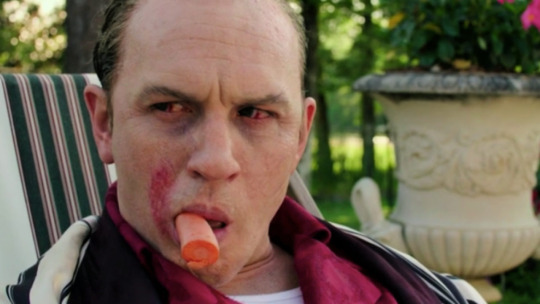
93. Capone (Josh Trank)- What is the point of this dinner theater trash? It takes place in the last year of Capone's life, when he was released from prison due to failing health and suffered a stroke in his Florida home. So it covers...none of the things that make Al Capone interesting? It's not historically accurate, which I have no problem with, but if you steer away from accuracy, then do something daring and exciting. Don't give me endless scenes of "Phonse"--as if the movie is running from the very person it's about--drawing bags of money that promise intrigue, then deliver nothing in return.
That being said, best "titular character shits himself" scene since The Judge.
92. Ammonite (Francis Lee)- I would say that this is the Antz to Portrait of a Lady on Fire's A Bug's Life, but it's actually more like the Cars 3 to Portrait of a Lady on Fire's Toy Story 1.
91. Ava (Tate Taylor)- Despite the mystery and inscrutability that usually surround assassins, what if we made a hitman movie but cared a lot about her personal life? Except neither the assassin stuff nor the family stuff is interesting?
90. Wonder Woman 1984 (Patty Jenkins)- What a miscalculation of what audiences loved about the first and wanted from the sequel. WW84 is silly and weightless in all of the ways that the first was elegant and confident. If the return of Pine is just a sort of phantom representation of Diana's desires, then why can he fly a real plane? If he is taking over another man's soul, then, uh, what ends up happening to that guy? For that matter, why is it not 1984 enough for Ronald Reagan to be president, but it is 1984 enough for the president to have so many Ronald Reagan signifiers that it's confusing? Why not just make a decision?
On paper, the me-first values of the '80s lend themselves to the monkey's paw wish logic of this plot. You could actually do something with the Star Wars program or the oil crisis. But not if the setting is played for only laughs and the screenplay explains only what it feels like.
89. Babyteeth (Shannon Murphy)- In this type of movie, there has to be a period of the Ben Mendelsohn character looking around befuddled about the new arrangement and going, "What's this now--he's going to be...living with us? The guy who tried to steal our medication? This is crazy!" But that's usually ten minutes, and in this movie it's an hour. I was so worn out by the end.
88. You Should Have Left (David Koepp)- David Koepp wrote Jurassic Park, so he's never going to hell, but how dare he start caring about his own mystery at the hour mark. There's a forty-five minute version of this movie that could get an extra star from me, and there's a three-hour version of Amanda Seyfried walking around in athleisure that would get four stars from me. What we actually get? No thanks.
87. Black Is King (Beyonce, et al.)- End your association with The Lion King, Bey. It has resulted in zero bops.
ADMIRABLE FAILURES
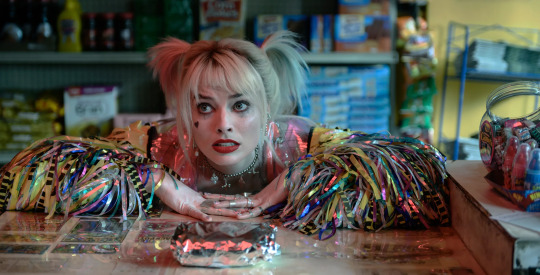
86. Birds of Prey (And the Fantabulous Emancipation of One Harley Quinn) (Cathy Yan)- There's nothing too dysfunctional in the storytelling or performances, but Birds of Prey also doesn't do a single thing well. I would prefer something alive and wild, even if it were flawed, to whatever tame belt-level formula this is.
85. The Turning (Floria Sigismondi)- This update of The Turn of the Screw pumps the age of Miles up to high school, which creates some horny creepiness that I liked. But the age of the character also prevents the ending of the novel from happening in favor of a truly terrible shrug. I began to think that all of the patience that the film showed earlier was just hesitance for its own awful ending.
I watched The Turning as a Mackenzie Davis Movie Star heat check, and while I'm not sure she has the magnetism I was looking for, she does have a great teacher voice, chastening but maternal.
84. Bloodshot (David Wilson)- A whole lot of Vin Diesel saying he's going to get revenge and kill a bunch of dudes; not a whole lot of Vin Diesel actually getting revenge and killing a bunch of dudes.
83. Downhill (Nat Faxon and Jim Rash)- I was an English major in college, which means I ended up locking myself into literary theories that, halfway through the writing of an essay, I realized were flawed. But rather than throw out the work that I had already proposed, I would just keep going and see if I could will the idea to success.
So let's say you have a theory that you can take Force Majeure by Ruben Ostlund, one of the best films of its year, and remake it so that its statement about familial anxiety could apply to Americans of the same age and class too...if it hadn't already. And maybe in the first paragraph you mess up by casting Will Ferrell and Julia Louis-Dreyfus, people we are conditioned to laugh at, when maybe this isn't that kind of comedy at all. Well, don't throw it away. You can quote more--fill up the pages that way--take an exact shot or scene from the original. Does that help? Maybe you can make the writing more vigorous and distinctive by adding a character. Is that going to make this baby stand out? Maybe you could make it more personal by adding a conclusion that is slightly more clever than the rest of the paper?
Or perhaps this is one you're just not going to get an A on.
82. Hillbilly Elegy (Ron Howard)- I watched this melodrama at my mother's encouragement, and, though I have been trying to pin down her taste for decades, I think her idea of a successful film just boils down to "a lot of stuff happens." So in that way, Ron Howard's loss is my gain, I guess.
There is no such thing as a "neutral Terminator."
81. Relic (Natalie Erika James)- The star of the film is Vanessa Cerne's set decoration, but the inert music and slow pace cancel out a house that seems neglected slowly over decades.
80. Buffaloed (Tanya Wexler)- Despite a breathless pace, Buffaloed can't quite congeal. In trying to split the difference between local color hijinks and Moneyballed treatise on debt collection, it doesn't commit enough to either one.
Especially since Zoey Deutch produced this one in addition to starring, I'm getting kind of worried about boo's taste. Lot of Two If by Seas; not enough While You Were Sleepings.
79. Like a Boss (Miguel Arteta)- I chuckled a few times at a game supporting cast that is doing heavy lifting. But Like a Boss is contrived from the premise itself--Yeah, what if people in their thirties fell out of friendship? Do y'all need a creative consultant?--to the escalation of most scenes--Why did they have to hide on the roof? Why do they have to jump into the pool?
The movie is lean, but that brevity hurts just as much as it helps. The screenplay knows which scenes are crucial to the development of the friendship, but all of those feel perfunctory, in a different gear from the setpieces.
To pile on a bit: Studio comedies are so bare bones now that they look like Lifetime movies. Arteta brought Chuck & Buck to Sundance twenty years ago, and, shot on Mini-DV for $250,000, it was seen as a DIY call-to-bootstraps. I guarantee that has more setups and locations and shooting days than this.
78. Eurovision Song Contest: The Story of Fire Saga (David Dobkin)- Add Dan Stevens to the list of supporting players who have bodied Will Ferrell in his own movie--one that he cared enough to write himself.
Like Downhill, Ferrell's other 2020 release, this isn't exactly bad. It's just workmanlike and, aside from the joke about Demi Lovato's "uninformed" ghost, frustratingly conventional.
77. The Traitor (Marco Bellochio)- Played with weary commitment by Pierfrancesco Favino, Tomasso Buscetta is "credited" as the first informant of La Cosa Nostra. And that sounds like an interesting subject for a "based on a true story" crime epic, right? Especially when you find out that Buscetta became a rat out of principle: He believed that the mafia to which he had pledged his life had lost its code to the point that it was a different organization altogether.
At no point does Buscetta waver or even seem to struggle with his decision though, so what we get is less conflicted than that description might suggest. None of these Italian mob movies glorify the lifestyle, so I wasn't expecting that. But if the crime doesn't seem enticing, and snitching on the crime seems like forlorn duty, and everything is pitched with such underhanded matter-of-factness that you can't even be sure when Buscetta has flipped, then what are we left with? It was interesting seeing how Italian courts work, I guess?
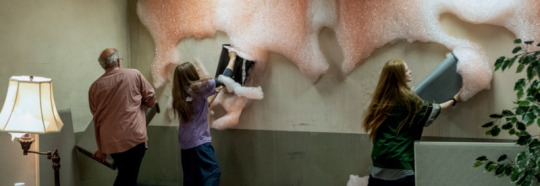
76. Kajillionaire (Miranda July)- This is another movie so intent on building atmosphere and lore that it takes too long to declare what it is. When the protagonist hits a breaking point and has to act, she has only a third of a film to grow. So whispery too.
Gina Rodriguez is the one to inject life into it. As soon as her motormouth winds up, the film slips into a different gear. The atmosphere and lore that I mentioned reeks of artifice, but her character is believably specific. Beneath a basic exterior is someone who is authentically caring but still morally compromised, beholden to the world that the other characters are suspicious of.
75. Scoob! (Tony Cervone)- The first half is sometimes clever, but it hammers home the importance of friendship while separating the friends.
The second half has some positive messaging, but your kids' movie might have a problem with scale if it involves Alexander the Great unlocking the gates of the Underworld.
My daughter loved it.
74. The Lovebirds (Michael Showalter)- If I start talking too much about this perfectly fine movie, I end up in that unfair stance of reviewing the movie I wanted, not what is actually there.* As a fan of hang-out comedies, I kind of resent that any comedy being made now has to be rolled into something more "exciting," whether it's a wrongfully accused or mistaken identity thriller or some other genre. Such is the post-Game Night world. There's a purposefully anti-climactic note that I wish The Lovebirds had ended on, but of course we have another stretch of hiding behind boats and shooting guns. Nanjiani and Rae are really charming leads though.
*- As a New Orleanian, I was totally distracted by the fake aspects of the setting too. "Oh, they walked to Jefferson from downtown? Really?" You probably won't be bothered by the locations.
73. Sonic the Hedgehog (Jeff Fowler)- In some ways the storytelling is ambitious. (I'm speaking for only myself, but I'm fine with "He's a hedgehog, and he's really fast" instead of the owl mother, teleportation backstory. Not everything has to be Tolkien.) But that ambition doesn't match the lack of ambition in the comedy, which depends upon really hackneyed setups and structures. Guiding Jim Carrey to full alrighty-then mode was the best choice anyone made.
72. Malcolm & Marie (Sam Levinson)- The stars move through these long scenes with agility and charisma, but the degree of difficulty is just too high for this movie to reach what it's going for.
Levinson is trying to capture an epic fight between a couple, and he can harness the theatrical intensity of such a thing, but he sacrifices almost all of the nuance. In real life, these knock-down-drag-outs can be circular and indirect and sad in a way that this couple's manipulation rarely is. If that emotional truth is all this movie is trying to achieve, I feel okay about being harsh in my judgment of how well it does that.
71. Beanpole (Kantemir Balagov)- Elusive in how it refuses to declare itself, forthright in how punishing it is. The whole thing might be worth it for a late dinner scene, but I'm getting a bit old to put myself through this kind of misery.
70. The Burnt Orange Heresy (Giuseppe Capotondi)- Silly in good ways until it's silly in bad ways. Elizabeth Debicki remains 6'3".
69. Everybody’s Everything (Sebastian Jones and Ramez Silyan)- As a person who listened to Lil Peep's music, I can confidently say that this documentary is overstating his greatness. His death was a significant loss, as the interview subjects will all acknowledge, but the documentary is more useful as a portrait of a certain unfocused, rapacious segment of a generation that is high and online at all times.
68. The Witches (Robert Zemeckis)- Robert Zemeckis, Kenya Barris, and Guillermo Del Toro are the credited screenwriters, and in a fascinating way, you can see the imprint of each figure on the final product. Adapting a very European story to the old wives' tales of the American South is an interesting choice. Like the Nicolas Roeg try at this material, Zemeckis is not afraid to veer into the terrifying, and Octavia Spencer's pseudo witch doctor character only sells the supernatural. From a storytelling standpoint though, it seems as if the obstacles are overcome too easily, as if there's a whole leg of the film that has been excised. The framing device and the careful myth-making of the flashback make promises that the hotel half of the film, including the abrupt ending, can't live up to.
If nothing else, Anne Hathaway is a real contender for Most On-One Performance of the year.
67. Irresistible (Jon Stewart)- Despite a sort of imaginative ending, Jon Stewart's screenplay feels more like the declarative screenplay that would get you hired for a good movie, not a good screenplay itself. It's provocative enough, but it's clumsy in some basic ways and never evades the easy joke.
For example, the Topher Grace character is introduced as a sort of assistant, then is re-introduced an hour later as a polling expert, then is shown coaching the candidate on presentation a few scenes later. At some point, Stewart combined characters into one role, but nothing got smoothed out.
ENDEARING CURIOSITIES WITH BIG FLAWS
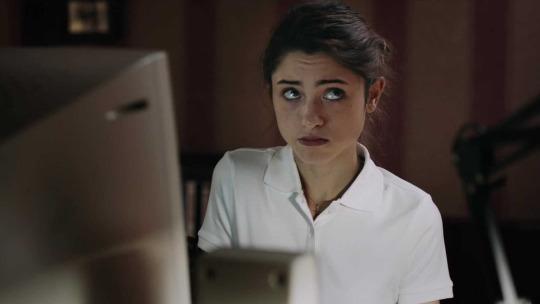
66. Yes, God, Yes (Karen Maine)- Most people who are Catholic, including me, are conflicted about it. Most people who make movies about being Catholic hate it and have an axe to grind. This film is capable of such knowing wit and nuance when it comes to the lived-in details of attending a high school retreat, but it's more concerned with taking aim at hypocrisy in the broad way that we've seen a million times. By the end, the film is surprisingly all-or-nothing when Christian teenagers actually contain multitudes.
Part of the problem is that Karen Maine's screenplay doesn't know how naive to make the Alice character. Sometimes she's reasonably naive for a high school senior in 2001; sometimes she's comically naive so that the plot can work; and sometimes she's stupid, which isn't the same as naive.
65. Bad Boys for Life (Adil El Arbi and Bilall Fallah)- This might be the first buddy cop movie in which the vets make peace with the tech-comm youngs who use new techniques. If that's the only novelty on display here--and it is--then maybe that's enough. I laughed maybe once. Not that the mistaken identity subplot of Bad Boys 1 is genius or anything, but this entry felt like it needed just one more layer to keep it from feeling as basic as it does. Speaking of layers though, it's almost impossible to watch any Will Smith movie now without viewing it through the meta-narrative of "What is Will Smith actually saying about his own status at this point in his career?" He's serving it up to us.
I derived an inordinate amount of pleasure from seeing the old school Simpson/Bruckheimer logo.
64. The Gentlemen (Guy Ritchie)- Look, I'm not going to be too negative on a movie whose crime slang is so byzantine that it has to be explained with subtitles. That's just me. I'm a simple man. But I can tell you that I tuned out pretty hard after seven or eight double-crosses.
The bloom is off the rose a bit for Ritchie, but he can still nail a music cue. I've been waiting for someone to hit "That's Entertainment" the way he does on the end credits.
63. Bad Hair (Justin Simien)- In Bad Hair, an African-American woman is told by her boss at a music video channel in 1989 that straightening her hair is the way to get ahead; however, her weave ends up having a murderous mind of its own. Compared to that charged, witty logline, the execution of the plot itself feels like a laborious, foregone conclusion. I'm glad that Simien, a genuinely talented writer, is making movies again though. Drop the skin-care routine, Van Der Beek!
62. Greyhound (Aaron Schneider)- "If this is the type of role that Tom Hanks writes for himself, then he understands his status as America's dad--'wise as the serpent, harmless as the dove'--even better than I thought."
"America's Dad! Aye aye, sir!"
"At least half of the dialogue is there for texture and authenticity, not there to be understood by the audience."
"Fifty percent, Captain!"
"The environment looks as fake as possible, but I eventually came around to the idea that the movie is completely devoid of subtext."
"No subtext to be found, sir!"
61. Mank (David Fincher)- About ten years ago, the Creative Screenwriting podcast spent an hour or so with James Vanderbilt, the writer of Zodiac and nothing else that comes close, as he relayed the creative paces that David Fincher pushed him through. Hundreds of drafts and years of collaborative work eventuated in the blueprint for Fincher's most exacting, personal film, which he didn't get a writing credit on only because he didn't seek one.
Something tells me that Fincher didn't ask for rewrites from his dead father. No matter what visuals and performances the director can coax from the script--and, to be clear, these are the worst visuals and performances of his career--they are limited by the muddy lightweight pages. There are plenty of pleasures, like the slippery election night montage or the shakily platonic relationship between Mank and Marion. But Fincher hadn't made a film in six years, and he came back serving someone else's master.
60. Tesla (Michael Almereyda)-
"You live inside your head."
"Doesn't everybody?"
As usual, Almereyda's deconstructions are invigorating. (No other moment can match the first time Eve Hewson's Anne fact-checks something with her anachronistic laptop.) But they don't add up to anything satisfying because Tesla himself is such an opaque figure. Driven by the whims of his curiosity without a clear finish line, the character gives Hawke something enigmatic to play as he reaches deep into a baritone. But he's too inward to lend himself to drama. Tesla feels of a piece with Almereyda's The Experimenter, and that's the one I would recommend.
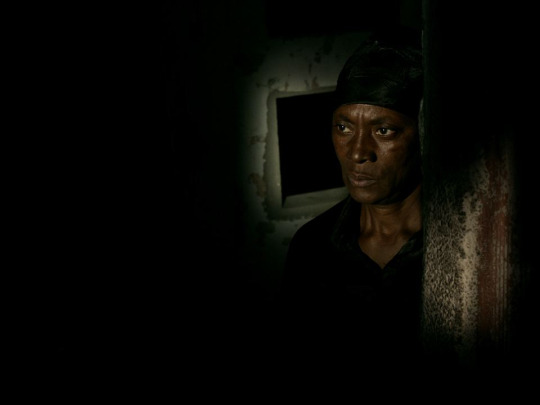
59. Vitalina Varela (Pedro Costa)- I can't oversell how delicately beautiful this film is visually. There's a scene in which Vitalina lugs a lantern into a church, but we get several seconds of total darkness before that one light source carves through it and takes over part of the frame. Each composition is as intricate as it is overpowering, achieving a balance between stark and mannered.
That being said, most of the film is people entering or exiting doors. I felt very little of the haunting loss that I think I was supposed to.
58. The Rhythm Section (Reed Morano)- Call it the Timothy Hutton in The General's Daughter Corollary: If a name-actor isn't in the movie much but gets third billing, then, despite whom he sends the protagonist to kill, he is the Actual Bad Guy.
Even if the movie serves up a lot of cliche, the action and sound design are visceral. I would like to see more from Morano.
57. Red, White and Blue (Steve McQueen)- Well-made and heartfelt even if it goes step-for-step where you think it will.
Here's what I want to know though: In the academy training sequence, the police cadets have to subdue a "berserker"; that is, a wildman who swings at their riot gear with a sledgehammer. Then they get him under control, and he shakes their hands, like, "Good angle you took on me there, mate." Who is that guy and where is his movie? Is this full-time work? Is he a police officer or an independent contractor? What would happen if this exercise didn't go exactly as planned?
56. Wolfwalkers (Tomm Moore and Ross Stewart)- The visuals have an unfinished quality that reminded me of The Tale of Princess Kaguya--the center of a flame is undrawn white, and fog is just negative space. There's an underlying symmetry to the film, and its color palette changes with mood.
Narratively, it's pro forma and drawn-out. Was Riley in Inside Out the last animated protagonist to get two parents? My daughter stuck with it, but she needed a lot of context for the religious atmosphere of 17th century Ireland.
55. What She Said: The Art of Pauline Kael (Rob Garver)- The film does little more than one might expect; it's limited in the way that any visual medium is when trying to sum up a woman of letters. But as far as education for Kael's partnership with Warren Beatty or the idea of The New Yorker paying her for only six months out of the year, it was useful for me.
Although Garver isn't afraid to point to the work that made Kael divisive, it would have been nice to have one or two interview subjects who questioned her greatness, rather than the crew of Paulettes who, even when they do say something like, "Sometimes I radically disagreed with her," do it without being able to point to any specifics.
54. Beastie Boys Story (Spike Jonze)- As far as this Spike Jonze completist is concerned, this is more of a Powerpoint presentation than a movie, Beastie Boys Story still warmed my heart, making me want to fire up Paul's Boutique again and take more pictures of my buddies.
53. Tenet (Christopher Nolan)- Cool and cold, tantalizing and frustrating, loud and indistinct, Tenet comes close to Nolan self-parody, right down to the brutalist architecture and multiple characters styled like him. The setpieces grabbed me, I'll admit.
Nolan's previous film, which is maybe his best, was "about" a lot and just happened to play with time; Tenet is only about playing with time.
PRETTY GOOD MOVIES
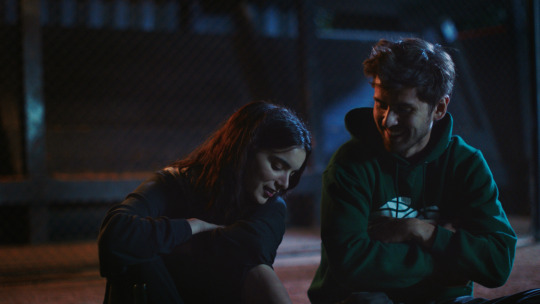
52. Shithouse (Cooper Raiff)- "Death is ass."
There's such a thing as too naturalistic. If I wanted to hear how college freshmen really talked, I would hang out with college freshmen. But you have to take the good verisimilitude with the bad, and good verisimilitude is the mother's Pod Save America t-shirt.
There are some poignant moments (and a gonzo performance from Logan Miller) in this auspicious debut from Cooper Raiff, the writer/director/editor/star. But the second party sequence kills some of the momentum, and at a crucial point, the characters spell out some motivation that should have stayed implied.
51. Totally Under Control (Alex Gibney, Ophelia Harutyunyan, Suzanne Hillinger)- As dense and informative as any other Gibney documentary with the added flex of making it during the pandemic it is investigating.
But yeah, why am I watching this right now? I don't need more reasons to be angry with Trump, whom this film calmly eviscerates. The directors analyze Trump's narcissism first through his contradictions of medical expertise in order to protect the economy that could win him re-election. Then it takes aim at his hiring based on loyalty instead of experience. But you already knew that, which is the problem with the film, at least for now.
50. Happiest Season (Clea Duvall)- I was in the perfect mood to watch something this frothy and bouncy. Every secondary character receives a moment in the sun, and Daniel Levy gets a speech that kind of saves the film at a tipping point.
I must say though: I wanted to punch Harper in her stupid face. She is a terrible romantic partner, abandoning or betraying Abby throughout the film and dissembling her entire identity to everyone else in a way that seems absurd for a grown woman in 2020. Run away, Kristen. Perhaps with Aubrey Plaza, whom you have more chemistry with. But there I go shipping and aligning myself with characters, which only proves that this is an effective romantic comedy.
49. The Way Back (Gavin O’Connor)- Patient but misshapen, The Way Back does just enough to overcome the cliches that are sort of unavoidable considering the genre. (I can't get enough of the parent character who, for no good reason, doesn't take his son's success seriously. "Scholarship? What he's gotta do is put his nose in them books! That's why I don't go to his games. [continues moving boxes while not looking at the other character] Now if you'll excuse me while I wait four scenes before showing up at a game to prove that I'm proud of him after all...")
What the movie gets really right or really wrong in the details about coaching and addiction is a total crap-shoot. But maybe I've said too much already.
48. The Whistlers (Corneliu Porumboiu)- Porumboiu is a real artist who seems to be interpreting how much surveillance we're willing to acknowledge and accept, but I won't pretend to have understood much of the plot, the chapters or which are told out of order. Sometimes the structure works--the beguiling, contextless "high-class hooker" sequence--but I often wondered if the film was impenetrable in the way that Porumboiu wanted it to be or impenetrable in the way he didn't.
To tell you the truth, the experience kind of depressed me because I know that, in my younger days, this film is the type of thing that I would re-watch, possibly with the chronology righted, knowing that it is worth understanding fully. But I have two small children, and I'm exhausted all the time, and I kind of thought I should get some credit for still trying to catch up with Romanian crime movies in the first place.
47. Borat Subsequent Moviefilm (Jason Woliner)- I laughed too much to get overly critical, but the film is so episodic and contrived that it's kind of exhausting by the end--even though it's achieving most of its goals. Maybe Borat hasn't changed, but the way our citizens own their ugliness has.
46. First Cow (Kelly Reichardt)- Despite how little happens in the first forty minutes, First Cow is a thoughtful capitalism parable. Even though it takes about forty minutes to get going, the friendship between Cookie and King-Lu is natural and incisive. Like Reichardt's other work, the film's modest premise unfolds quite gracefully, except for in the first forty minutes, which are uneventful.
45. Les Miserables (Ladj Ly)- I loved parts of the film--the disorienting, claustrophobic opening or the quick look at the police officers' home lives, for example. But I'm not sure that it does anything very well. The needle the film tries to thread between realism and theater didn't gel for me. The ending, which is ambiguous in all of the wrong ways, chooses the theatrical. (If I'm being honest, my expectations were built up by Les Miserables' Jury Prize at Cannes, and it's a bit superficial to be in that company.)
If nothing else, it's always helpful to see how another country's worst case scenario in law enforcement would look pretty good over here.
44. Bad Education (Cory Finley)- The film feels too locked-down and small at the beginning, so intent on developing the protagonist neutrally that even the audience isn't aware of his secrets. So when he faces consequences for those secrets, there's a disconnect. Part of tragedy is seeing the doom coming, right?
When it opens up, however, it's empathetic and subtle, full of a dry irony that Finley is already specializing in after only one other feature. Geraldine Viswanathan and Allison Janney get across a lot of interiority that is not on the page.
43. The Trip to Greece (Michael Winterbottom)- By the fourth installment, you know whether you're on board with the franchise. If you're asking "Is this all there is?" to Coogan and Brydon's bickering and impressions as they're served exotic food in picturesque settings, then this one won't sway you. If you're asking "Is this all there is?" about life, like they are, then I don't need to convince you.
I will say that The Trip to Spain seemed like an enervated inflection point, at which the squad could have packed it in. The Trip to Greece proves that they probably need to keep doing this until one of them dies, which has been the subtext all along.
42. Feels Good Man (Arthur Jones)- This documentary centers on innocent artist Matt Furie's helplessness as his Pepe the Frog character gets hijacked by the alt-right. It gets the hard things right. It's able to, quite comprehensively, trace a connection from 4Chan's use of Pepe the Frog to Donald Trump's near-assuming of Pepe's ironic deniability. Director Arthur Jones seems to understand the machinations of the alt-right, and he articulates them chillingly.
The easy thing, making us connect to Furie, is less successful. The film spends way too much time setting up his story, and it makes him look naive as it pits him against Alex Jones in the final third. Still, the film is a quick ninety-two minutes, and the highs are pretty high.
41. The Old Guard (Gina Prince-Bythewood)- Some of the world-building and backstory are handled quite elegantly. The relationships actually do feel centuries old through specific details, and the immortal conceit comes together for an innovative final action sequence.
Visually and musically though, the film feels flat in a way that Prince-Bythewood's other films do not. I blame Netflix specs. KiKi Layne, who tanked If Beale Street Could Talk for me, nearly ruins this too with the child-actory way that she stresses one word per line. Especially in relief with one of our more effortless actresses, Layne is distracting.
40. The Trial of the Chicago 7 (Aaron Sorkin)- Whenever Sacha Baron Cohen's Abbie Hoffman opens his mouth, the other defendants brace themselves for his dismissive vulgarity. Even when it's going to hurt him, he can't help but shoot off at the mouth. Of course, he reveals his passionate and intelligent depths as the trial goes on. The character is the one that Sorkin's screenplay seems the most endeared to: In the same way that Hoffman can't help but be Hoffman, Sorkin can't help but be Sorkin. Maybe we don't need a speech there; maybe we don't have to stretch past two hours; maybe a bon mot diffuses the tension. But we know exactly what to expect by now. The film is relevant, astute, witty, benevolent, and, of course, in love with itself. There are a handful of scenes here that are perfect, so I feel bad for qualifying so much.
A smaller point: Daniel Pemberton has done great work in the past (Motherless Brooklyn, King Arthur, The Man from U.N.C.L.E.), but the first sequence is especially marred by his sterile soft-rock approach.
GOOD MOVIES
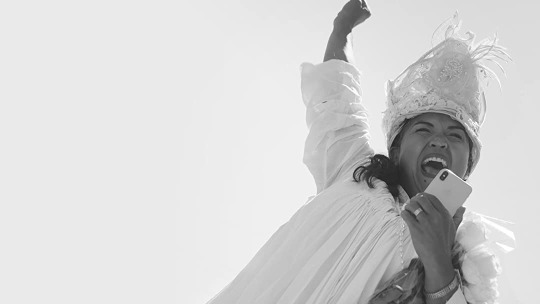
39. Time (Garrett Bradley)- The key to Time is that it provides very little context. Why the patriarch of this family is serving sixty years in prison is sort of besides the point philosophically. His wife and sons have to move on without him, and the tragedy baked into that fact eclipses any notion of what he "deserved." Feeling the weight of time as we switch back and forth between a kid talking about his first day of kindergarten and that same kid graduating from dentistry school is all the context we need. Time's presentation can be quite sumptuous: The drone shot of Angola makes its buildings look like crosses. Or is it X's?
At the same time, I need some context. When director Garrett Bradley withholds the reason Robert's in prison, and when she really withholds that Fox took a plea and served twelve years, you start to see the strings a bit. You could argue that knowing so little about why, all of a sudden, Robert can be on parole puts you into the same confused shoes as the family, but it feels manipulative to me. The film is preaching to the choir as far as criminal justice goes, which is fine, but I want it to have the confidence to tell its story above board.
38. Bloody Nose, Empty Pockets (Turner Ross and Bill Ross IV)- I have a barfly friend whom I see maybe once a year. When we first set up a time to meet, I kind of dread it and wonder what we'll have to talk about. Once we do get together, we trip on each other's words a bit, fumbling around with the rhythm of conversation that we mastered decades ago. He makes some kind of joke that could have been appropriate then but isn't now.
By the end of the day, hours later, we're hugging and maybe crying as we promise each other that we won't wait as long next time.
That's the exact same journey that I went on with this film.
37. Underwater (William Eubank)- Underwater is a story that you've seen before, but it's told with great confidence and economy. I looked up at twelve minutes and couldn't believe the whole table had been set. Kristen plays Ripley and projects a smart, benevolent poise.
36. The Lodge (Veronika Franz and Severin Fiala)- I prefer the grounded, manicured first half to the more fantastic second half. The craziness of the latter is only possible through the hard work of the former though. As with Fiala and Franz's previous feature, the visual rhymes and motifs get incorporated into the soup so carefully that you don't realize it until they overwhelm you in their bleak glory.
Small note: Alicia Silverstone, the male lead's first wife, and Riley Keough, his new partner, look sort of similar. I always think that's a nice note: "I could see how he would go for her."
35. Miss Americana (Lana Wilson)- I liked it when I saw it as a portrait of a person whose life is largely decided for her but is trying to carve out personal spaces within that hamster wheel. I loved it when I realized that describes most successful people in their twenties.
34. Sound of Metal (Darius Marder)- Riz Ahmed is showing up on all of the best performances of the year lists, but Sound of Metal isn't in anyone's top ten films of the year. That's about right. Ahmed's is a quiet, stubborn performance that I wish was in service of more than the straight line that we've seen before.
In two big scenes, there's this trick that Ahmed does, a piecing together of consequences with his eyes, as if he's moving through a flow chart in real time. In both cases, the character seems locked out and a little slower than he should be, which is, of course, why he's facing the consequences in the first place. To be charitable to a film that was a bit of a grind, it did make me notice a thing a guy did with his eyes.
33. Pieces of a Woman (Kornel Mundruczo)- Usually when I leave acting showcases like this, I imagine the film without the Oscar-baiting speeches, but this is a movie that specializes in speeches. Pieces of a Woman is being judged, deservedly so, by the harrowing twenty-minute take that opens the film, which is as indulgent as it is necessary. But if the unbroken take provides the "what," then the speeches provide the "why."
This is a film about reclaiming one's body when it rebels against you and when other people seek ownership of it. Without the Ellen Burstyn "lift your head" speech or the Vanessa Kirby show-stopper in the courtroom, I'm not sure any of that comes across.
I do think the film lets us off the hook a bit with the LaBoeuf character, in the sense that it gives us reasons to dislike him when it would be more compelling if he had done nothing wrong. Does his half-remembering of the White Stripes count as a speech?
32. Ma Rainey’s Black Bottom (George C. Wolfe)- This is such a play, not only in the locked-down location but also through nearly every storytelling convention: "Where are the two most interesting characters? Oh, running late? They'll enter separately in animated fashion?" But, to use the type of phrase that the characters might, "Don't hate the player; hate the game."
Perhaps the most theatrical note in this treatise on the commodification of expression is the way that, two or three times, the proceedings stop in their tracks for the piece to declare loudly what it's about. In one of those clear-outs, Boseman, who looks distractingly sick, delivers an unforgettable monologue that transports the audience into his character's fragile, haunted mind. He and Viola Davis are so good that the film sort of buckles under their weight, unsure of how to transition out of those spotlight moments and pretend that the story can start back up. Whatever they're doing is more interesting than what's being achieved overall.
31. Another Round (Thomas Vinterberg)- It's definitely the film that Vinterberg wanted to make, but despite what I think is a quietly shattering performance from Mikkelsen, Another Round moves in a bit too much of a straight line to grab me fully. The joyous final minutes hint at where it could have gone, as do pockets of Vinterberg's filmography, which seems newly tethered to realism in a way that I don't like. The best sequences are the wildest ones, like the uproarious trip to the grocery store for fresh cod, so I don't know why so much of it takes place in tiny hallways at magic hour. I give the inevitable American remake* permission to use these notes.
*- Just spitballing here. Martin: Will Ferrell, Nikolaj (Nick): Ben Stiller, Tommy: Owen Wilson, Peter: Craig Robinson
30. The Invisible Man (Leigh Whannell)- Exactly what I wanted. Exactly what I needed.
I think a less conclusive finale would have been better, but what a model of high-concept escalation. This is the movie people convinced me Whannell's Upgrade was.
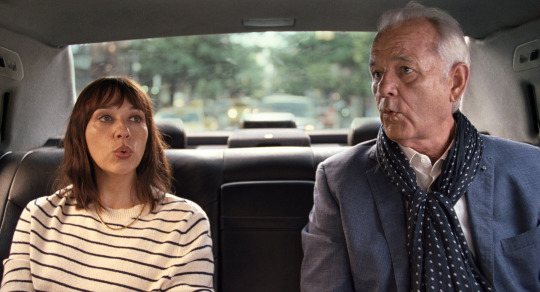
29. On the Rocks (Sofia Coppola)- Slight until the Mexican sojourn, which expands the scope and makes the film even more psychosexual than before. At times it feels as if Coppola is actively simplifying, rather than diving into the race and privilege questions that the Murray character all but demands.
As for Murray, is the film 50% worse without him? 70%? I don't know if you can run in supporting categories if you're the whole reason the film exists.
28. Mangrove (Steve McQueen)- The first part of the film seemed repetitive and broad to me. But once it settled in as a courtroom drama, the characterization became more shaded, and the filmmaking itself seemed more fluid. I ended up being quite outraged and inspired.
27. Shirley (Josephine Decker)- Josephine Decker emerges as a real stylist here, changing her foggy, impressionistic approach not one bit with a little more budget. Period piece and established actors be damned--this is still as much of a reeling fever dream as Madeline's Madeline. Both pieces are a bit too repetitive and nasty for my taste, but I respect the technique.
Here's my mandatory "Elisabeth Moss is the best" paragraph. While watching her performance as Shirley Jackson, I thought about her most famous role as Peggy on Mad Men, whose inertia and need to prove herself tied her into confidence knots. Shirley is almost the opposite: paralyzed by her worldview, certain of her talent, rejecting any empathy. If Moss can inhabit both characters so convincingly, she can do anything.
26. An American Pickle (Brandon Trost)- An American Pickle is the rare comedy that could actually use five or ten extra minutes, but it's a surprisingly heartfelt and wholesome stretch for Rogen, who is earnest in the lead roles.
25. The King of Staten Island (Judd Apatow)- At two hours and fifteen minutes, The King of Staten Island is probably the first Judd Apatow film that feels like the exact right length. For example, the baggy date scene between a gracious Bill Burr and a faux-dowdy Marisa Tomei is essential, the sort of widening of perspective that something like Trainwreck was missing.
It's Pete Davidson's movie, however, and though he has never been my cup of tea, I think he's actually quite powerful in his quiet moments. The movie probes some rare territory--a mentally ill man's suspicion that he is unlovable, a family's strategic myth-making out of respect for the dead. And when Davidson shows up at the firehouse an hour and fifteen minutes in, it feels as if we've built to a last resort.
24. Swallow (Carlo Mirabella-Davis)- The tricky part of this film is communicating Hunter's despair, letting her isolation mount, but still keeping her opaque. It takes a lot of visual discipline to do that, and Claudio Mirabella-Davis is up to the task. This ends up being a much more sympathetic, expressive movie than the plot description might suggest.
(In the tie dispute, Hunter and Richie are both wrong. That type of silk--I couldn't tell how pebbled it was, but it's probably a barathea weave-- shouldn't be ironed directly, but it doesn't have to be steamed. On a low setting, you could iron the back of the tie and be fine.)
23. The Vast of Night (Andrew Patterson)- I wanted a bit more "there" there; The film goes exactly where I thought it would, and there isn't enough humor for my taste. (The predictability might be a feature, not a bug, since the film is positioned as an episode of a well-worn Twilight Zone-esque show.)
But from a directorial standpoint, this is quite a promising debut. Patterson knows when to lock down or use silence--he even cuts to black to force us to listen more closely to a monologue. But he also knows when to fill the silence. There's a minute or so when Everett is spooling tape, and he and Fay make small talk about their hopes for the future, developing the characters' personalities in what could have been just mechanics. It's also a refreshingly earnest film. No one is winking at the '50s setting.
I'm tempted to write, "If Andrew Patterson can make this with $1 million, just imagine what he can do with $30 million." But maybe people like Shane Carruth have taught us that Patterson is better off pinching pennies in Texas and following his own muse.
22. Martin Eden (Pietro Marcello)- At first this film, adapted from a picaresque novel by Jack London, seemed as if it was hitting the marks of the genre. "He's going from job to job and meeting dudes who are shaping his worldview now." But the film, shot in lustrous Super 16, won me over as it owned the trappings of this type of story, forming a character who is a product of his environment even as he transcends it. By the end, I really felt the weight of time.
You want to talk about something that works better in novels than films though? When a passionate, independent protagonist insists that a woman is the love of his life, despite the fact that she's whatever Italians call a wet blanket. She's rich, but Martin doesn't care about her money. He hates her family and friends, and she refuses to accept him or his life pursuits. She's pretty but not even as pretty as the waitress they discuss. Tell me what I'm missing here. There's archetype, and there's incoherence.
21. Bacurau (Kleber Mendonca Filho and Juliano Dornelles)- Certain images from this adventurous film will stick with me, but I got worn out after the hard reset halfway through. As entranced as I was by the mystery of the first half, I think this blood-soaked ensemble is better at asking questions than it is at answering them.
20. Let Them All Talk (Steven Soderbergh)- The initial appeal of this movie might be "Look at these wonderful actresses in their seventies getting a movie all to themselves." And the film is an interesting portrait of ladies taking stock of relationships that have spanned decades. But Soderbergh and Eisenberg handle the twentysomething Lucas Hedges character with the same openness and empathy. His early reasoning for going on the trip is that he wants to learn from older women, and Hedges nails the puppy-dog quality of a young man who would believe that. Especially in the scenes of aspirational romance, he's sweet and earnest as he brushes his hair out of his face.
Streep plays Alice Hughes, a serious author of literary fiction, and she crosses paths with Kelvin Kranz, a grinder of airport thrillers. In all of the right ways, Let Them All Talk toes the line between those two stances as an entertaining, jaunty experiment that also shoulders subtextual weight. If nothing else, it's easy to see why a cruise ship's counterfeit opulence, its straight lines at a lean, would be visually engaging to Soderbergh. You can't have a return to form if your form is constantly evolving.

19. Dick Johnson Is Dead (Kirsten Johnson)- Understandably, I don't find the subject as interesting as his own daughter does, and large swaths of this film are unsure of what they're trying to say. But that's sort of the point, and the active wrestling that the film engages in with death ultimately pays off in a transcendent moment. The jaw-dropping ending is something that only non-fiction film can achieve, and Johnson's whole career is about the search for that sort of serendipity.
18. Da 5 Bloods (Spike Lee)- Delroy Lindo is a live-wire, but his character is the only one of the principals who is examined with the psychological depth I was hoping for. The first half, with all of its present-tense flourishes, promises more than the gunfights of the second half can deliver. When the film is cooking though, it's chock full of surprises, provocations, and pride.
17. Never Rarely Sometimes Always (Eliza Hittmann)- Very quickly, Eliza Hittmann has established herself as an astute, empathetic director with an eye for discovering new talent. I hope that she gets to make fifty more movies in which she objectively follows laconic young people. But I wanted to like this one more than I did. The approach is so neutral that it's almost flat to me, lacking the arc and catharsis of her previous film, Beach Rats. I still appreciate her restraint though.
GREAT MOVIES
16. Young Ahmed (Jean-Pierre Dardenne and Luc Dardenne)- I don't think the Dardennes have made a bad movie yet, and I'm glad they turned away from the slight genre dipping of The Unknown Girl, the closest to bad that they got. Young Ahmed is a lean, daring return to form.
Instead of following an average person, as they normally do, the Dardenne Brothers follow an extremist, and the objectivity that usually generates pathos now serves to present ambiguity. Ahmed says that he is changing, that he regrets his actions, but we never know how much of his stance is a put-on. I found myself wanting him to reform, more involved than I usually am in these slices of life. Part of it is that Idir Ben Addi looks like such a normal, young kid, and the Ahmed character has most of the qualities that we say we want in young people: principles, commitment, self-worth, reflection. So it's that much more destructive when those qualities are used against him and against his fellow man.
15. World of Tomorrow Episode Three: The Absent Destinations of David Prime (Don Hertzfeldt)- My dad, a man whom I love but will never understand, has dismissed modern music before by claiming that there are only so many combinations of chords. To him, it's almost impossible to do something new. Of course, this is the type of thing that an uncreative person would say--a person not only incapable of hearing the chords that combine notes but also unwilling to hear the space between the notes. (And obviously, that's the take of a person who doesn't understand that, originality be damned, some people just have to create.)
Anyway, that attitude creeps into my own thinking more than I would like, but then I watch something as wholly original as World of Tomorrow Episode Three. The series has always been a way to pile sci-fi ideas on top of each other to prove the essential truths of being and loving. And this one, even though it achieves less of a sense of yearning than its predecessor, offers even more devices to chew on. Take, for example, the idea that Emily sends her message from the future, so David's primitive technology can barely handle it. In order to move forward with its sophistication, he has to delete any extraneous skills for the sake of computer memory. So out of trust for this person who loves him, he has to weigh whether his own breathing or walking can be uninstalled as a sacrifice for her. I thought that we might have been done describing love, but there it is, a new metaphor. Mixing futurism with stick figures to get at the most pure drive possible gave us something new. It's called art, Dad.
14. On the Record (Kirby Dick and Amy Ziering)- We don't call subjects of documentaries "stars" for obvious reasons, but Drew Dixon kind of is one. Her honesty and wisdom tell a complete story of the #MeToo movement. Kirby Dick and Amy Ziering take their time developing her background at first, not because we need to "gain sympathy" or "establish credibility" for a victim of sexual abuse, but because showing her talent and enthusiasm for hip-hop A&R makes it that much more tragic when her passion is extinguished. Hell, I just like the woman, so spending a half-hour on her rise was pleasurable in and of itself.
This is a gut-wrenching, fearless entry in what is becoming Dick and Ziering's raison d'etre, but its greatest quality is Dixon's composed reflection. She helped to establish a pattern of Russell Simmons's behavior, but she explains what happened to her in ways I had never heard before.
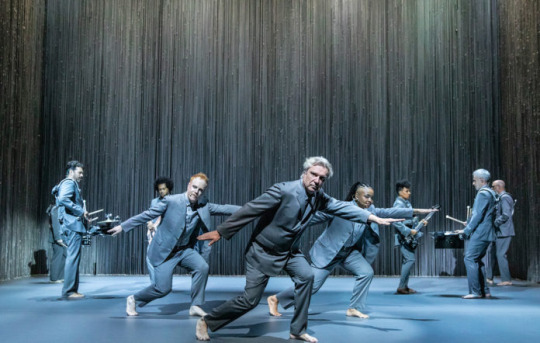
13. David Byrne’s American Utopia (Spike Lee)- I'm often impressed by the achievements that puzzle me: How did they pull that off? But I know exactly how David Byrne pulled off the impish but direct precision of American Utopia: a lot of hard work.
I can't blame Spike Lee for stealing a page from Demme's Stop Making Sense: He denies us a close-up of any audience members until two-thirds of the way through, when we get someone in absolute rapture.
12. One Night in Miami... (Regina King)- We've all cringed when a person of color is put into the position of speaking on behalf of his or her entire race. But the characters in One Night in Miami... live in that condition all the time and are constantly negotiating it. As Black public figures in 1964, they know that the consequences of their actions are different, bigger, than everyone else's. The charged conversations between Malcolm X and Sam Cooke are not about whether they can live normal lives. They're way past that. The stakes are closer to Sam Cooke arguing that his life's purpose aligns with the protection and elevation of African-Americans while Malcolm X argues that those pursuits should be the same thing. Late in the movie, Cassius Clay leaves the other men, a private conversation, to talk to reporters, a public conversation. But the film argues that everything these men do is always already public. They're the most powerful African-Americans in the country, but their lives are not their own. Or not only their own.
It's true that the first act has the clunkiness and artifice of a TV movie, but once the film settles into the motel room location and lets the characters feed off one another, it's gripping. It's kind of unfair for a movie to get this many scenes of Leslie Odom Jr. singing, but I'll take it.
11. Saint Frances (Alex Thompson)- Rilke wrote, "Perhaps everything terrible is in its deepest being something helpless that wants help from us." The characters' behavior in Saint Frances--all of these fully formed characters' behavior--made me think of that quotation. When they lash out at one another, even at their nastiest, the viewer has a window into how they're expressing pain they can't verbalize. The film is uneven in its subtlety, but it's a real showcase for screenwriter and star Kelly O'Sullivan, who is unflinching and dynamic in one of the best performances of the year. Somebody give her some of the attention we gave to Zach Braff for God's sake.
10. Boys State (Jesse Moss and Amanda McBaine)- This documentary is kind of a miracle from a logistical standpoint. From casting interviews beforehand, lots of editing afterwards, or sly note-taking once the conference began, McBaine and Moss happened to select the four principals who mattered the most at the convention, then found them in rooms full of dudes wearing the same tucked-in t-shirt. By the way, all of the action took place over the course of one week, and by definition, the important events are carved in half.
To call Boys State a microcosm of American politics is incorrect. These guys are forming platforms and voting in elections. What they're doing is American politics, so when they make the same compromises and mistakes that active politicians do, it produces dread and disappointment. So many of the boys are mimicking the political theater that they see on TV, and that sweaty sort of performance is going to make a Billy Mitchell out of this kid Ben Feinstein, and we'll be forced to reckon with how much we allow him to evolve as a person. This film is so precise, but what it proves is undeniably messy. Luckily, some of these seventeen-year-olds usher in hope for us all.
If nothing else, the film reveals the level to which we're all speaking in code.
9. The Nest (Sean Durkin)- In the first ten minutes or so of The Nest, the only real happy minutes, father and son are playing soccer in their quaint backyard, and the father cheats to score on a children's net before sliding on the grass to rub in his victory. An hour later, the son kicks the ball around by himself near a regulation goal on the family's massive property. The contrast is stark and obvious, as is the symbolism of the dead horse, but that doesn't mean it's not visually powerful or resonant.
Like Sean Durkin's earlier film, Martha Marcy May Marlene, the whole of The Nest is told with detail of novelistic scope and an elevation of the moment. A snippet of radio that mentions Ronald Reagan sets the time period, rather than a dateline. One kid saying "Thanks, Dad" and another kid saying, "Thanks, Rory" establishes a stepchild more elegantly than any other exposition might.
But this is also a movie that does not hide what it means. Characters usually say exactly what is on their minds, and motivations are always clear. For example, Allison smokes like a chimney, so her daughter's way of acting out is leaving butts on the window sill for her mother to find. (And mother and daughter both definitely "act out" their feelings.) On the other hand, Ben, Rory's biological son, is the character least like him, so these relationships aren't too directly parallel. Regardless, Durkin uses these trajectories to cast a pall of familial doom.
8. Sorry We Missed You (Sean Durkin)- Another precisely calibrated empathy machine from Ken Loach. The overwhelmed matriarch, Abby, is a caretaker, and she has to break up a Saturday dinner to rescue one of her clients, who wet herself because no one came to help her to the bathroom. The lady is embarrassed, and Abby calms her down by saying, "You mean more to me than you know." We know enough about Abby's circumstances to realize that it's sort of a lie, but it's a beautiful lie, told by a person who cares deeply but is not cared for.
Loach's central point is that the health of a family, something we think of as immutable and timeless, is directly dependent upon the modern industry that we use to destroy ourselves. He doesn't have to be "proven" relevant, and he didn't plan for Covid-19 to point to the fragility of the gig economy, but when you're right, you're right.
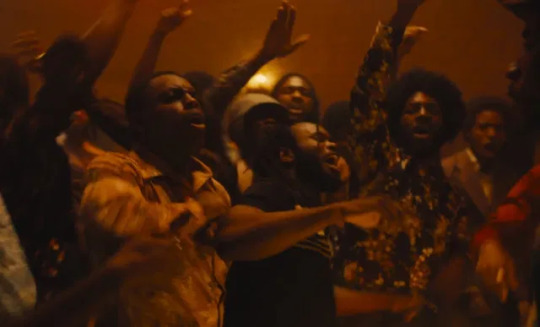
7. Lovers Rock (Steve McQueen)- swear to you I thought: "This is an impeccable depiction of a great house party. The only thing it's missing is the volatile dude who scares away all the girls." And then the volatile dude who scares away all the girls shows up.
In a year short on magic, there are two or three transcendent moments, but none of them can equal the whole crowd singing along to "Silly Games" way after the song has ended. Nothing else crystallizes the film's note of celebration: of music, of community, of safe spaces, of Black skin. I remember moments like that at house parties, and like all celebrations, they eventually make me sad.
6. Crip Camp: A Disability Revolution (Nicole Newnham and James Lebrecht)- I held off on this movie because I thought that I knew what it was. The setup was what I expected: A summer camp for the disabled in the late '60s takes on the spirit of the time and becomes a haven for people who have not felt agency, self-worth, or community anywhere else. But that's the right-place-right-time start of a story that takes these figures into the '80s as they fight for their rights.
If you're anything like my dumb ass, you know about 504 accommodations from the line on a college syllabus that promises equal treatment. If 2020 has taught us anything though, it's that rights are seized, not given, and this is the inspiring story of people who unified to demand what they deserved. Judy Heumann is a civil rights giant, but I'm ashamed to say I didn't know who she was before this film. If it were just a history lesson that wasn't taught in school, Crip Camp would still be valuable, but it's way more than that.
5. Palm Springs (Max Barbakow)- When explaining what is happening to them, Andy Samberg's Nyles twirls his hand at Cristin Milioti's Sara and says, "It's one of those infinite time-loop scenarios." Yeah, one of those. Armed with only a handful of fictional examples, she and the audience know exactly what he means, and the continually inventive screenplay by Andy Siara doesn't have to do any more explaining. In record time, the film accelerates into its premise, involves her, and sets up the conflict while avoiding the claustrophobia of even Groundhog Day. That economy is the strength that allows it to be as funny as it is. By being thrifty with the setup, the savings can go to, say, the couple crashing a plane into a fiery heap with no consequences.
In some accidental ways, this is, of course, a quarantine romance as well. Nyles and Sara frustratingly navigate the tedious wedding as if they are play-acting--which they sort of are--then they push through that sameness to grow for each other, realizing that dependency is not weakness. The best relationships are doing the same thing right now.
Although pointedly superficial--part of the point of why the couple is such a match--and secular--I think the notion of an afterlife would come up at least once--Palm Springs earns the sincerity that it gets around to. And for a movie ironic enough to have a character beg to be impaled so that he doesn't have to sit in traffic, that's no small feat.
4. The Assistant (Kitty Green)- A wonder of Bressonian objectivity and rich observation, The Assistant is the rare film that deals exclusively with emotional depth while not once explaining any emotions. One at a time, the scrape of the Kleenex box might not be so grating, the long hallway trek to the delivery guy might not be so tiring, but this movie gets at the details of how a job can destroy you in ways that add up until you can't even explain them.
3. Promising Young Woman (Emerald Fennell)- In her most incendiary and modern role, Carey Mulligan plays Cassie, which is short for Cassandra, that figure doomed to tell truths that no one else believes. The web-belted boogeyman who ruined her life is Al, short for Alexander, another Greek who is known for his conquests. The revenge story being told here--funny in its darkest moments, dark in its funniest moments--is tight on its surface levels, but it feels as if it's telling a story more archetypal and expansive than that too.
An exciting feature debut for its writer-director Emerald Fennell, the film goes wherever it dares. Its hero has a clear purpose, and it's not surprising that the script is willing to extinguish her anger halfway through. What is surprising is the way it renews and muddies her purpose as she comes into contact with half-a-dozen brilliant one- or two-scene performances. (Do you think Alfred Molina can pull off a lawyer who hates himself so much that he can't sleep? You would be right.)
Promising Young Woman delivers as an interrogation of double standards and rape culture, but in quiet ways it's also about our outsized trust in professionals and the notion that some trauma cannot be overcome.
INSTANT CLASSICS
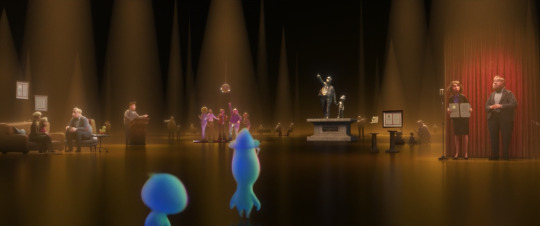
2. Soul (Pete Docter)- When Pete Docter's Up came out, it represented a sort of coronation for Pixar: This was the one that adults could like unabashedly. The one with wordless sequences and dead children and Ed Asner in the lead. But watching it again this week with my daughter, I was surprised by how high-concept and cloying it could be. We choose not to remember the middle part with the goofy dog stuff.
Soul is what Up was supposed to be: honest, mature, stirring. And I don't mean to imply that a family film shouldn't make any concessions to children. But Soul, down to the title, never compromises its own ambition. Besides Coco, it's probably the most credible character study that Pixar has ever made, with all of Joe's growth earned the hard way. Besides Inside Out, it's probably the wittiest comedy that Pixar has ever made, bursting with unforced energy.
There's a twitter fascination going around about Dez, the pigeon-figured barber character whose scene has people gushing, "Crush my windpipe, king" or whatever. Maybe that's what twitter does now, but no one fantasized about any characters in Up. And I count that as progress.
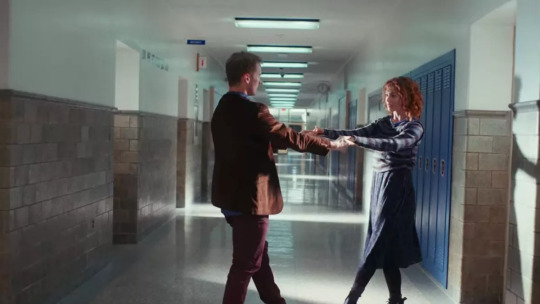
1. I’m Thinking of Ending Things (Charlie Kaufman)- After hearing that our name-shifting protagonist moonlights as an artist, a no-nonsense David Thewlis offers, "I hope you're not an abstract artist." He prefers "paintings that look like photographs" over non-representational mumbo-jumbo. And as Jessie Buckley squirms to try to think of a polite way to talk back, you can tell that Charlie Kaufman has been in the crosshairs of this same conversation. This morose, scary, inscrutable, expressionist rumination is not what the Netflix description says it is at all, and it's going to bother nice people looking for a fun night in. Thank God.
The story goes that Steven Spielberg and George Lucas, when constructing Raiders of the Lost Ark, sought to craft a movie that was "only the good parts" with little of the clunky setup that distracted from action. What we have here is a Charlie Kaufman movie with only the Charlie Kaufman moments, less interested than ever before at holding one's hand. The biting humor is here, sometimes aimed at philistines like the David Thewlis character above, sometimes at the niceties that we insist upon. The lonely horror of everyday life is here, in the form of missed calls from oneself or the interruption of an inner monologue. Of course, communicating the overwhelming crush of time, both unknowable and familiar, is the raison d'etre.
A new pet motif seems to be the way that we don't even own our own knowledge. The Young Woman recites "Bonedog" by Eva H.D., which she claims/thinks she wrote, only to find Jake's book open to that page, next to a Pauline Kael book that contains a Woman Under the Influence review that she seems to have internalized later. When Jake muses about Wordsworth's "Lucy Poems," it starts as a way to pass the time, then it becomes a way to lord his education over her, then it becomes a compliment because the subject resembles her, then it becomes a way to let her know that, in the grand scheme of things, she isn't that special at all. This film jerks the viewer through a similar wintry cycle and leaves him with his own thoughts. It's not a pretty picture, but it doesn't look like anything else.
8 notes
·
View notes
Audio
(via https://open.spotify.com/playlist/0iwQAxebwKN8YvN7IFnC6m?si=q5AKs7ZPRBG1rGiR_s9_SA)
Music was as good in 2020 as everything else was bad. Several of these songs are about frustration in the wake of isolation and paralysis, and I'm sure there's an explanation for that. I reconnected with emo and hardcore this year too, and I'm sure there's an explanation for that. I listened to more country, and I'm not sure there's an explanation for that. But no matter what, music was there for me.
The songs are ranked strictly; each artist gets only one spot.
1 note
·
View note
Audio
(via https://open.spotify.com/playlist/76uieZjQJF17IK6M8EnThE?si=dPuXg_0ZTgC9RVIA3KnMYA)
0 notes
Text
1 note
·
View note
Audio
2020 Best of the Year So Far
Unlike the movie industry, music didn’t just stop for a plague. These six months have been pretty great for new releases actually. As usual, these are ranked--exactly near the top, loosely near the bottom. Each artist can have two songs on the list, though that won’t be the case at year’s end.
0 notes
Audio
(via https://open.spotify.com/playlist/638u5SvS1oj1WYXqLUigg4?si=v4O1rvOeS__9ZhQ7URWX6w)
0 notes
Text
0 notes
Video
Every Friday the 13th Movie Playing Simultaneously
Eight films of the 1980 horror series playing simultaneously. A study in repetition and rhythm. 1 hour and 33 minutes.
I actually started a version of this 10 years ago, when I was doing a lot of exhibition video and audio in this style. I stopped back then due to rendering issues. Jump forward to a worldwide pandemic, a new SSD drive, and here it is.
14 notes
·
View notes
Text
The Best Films of 2019, Part VI
Yes, I know that it’s almost March. Thanks for taking the ride.
GREAT MOVIES
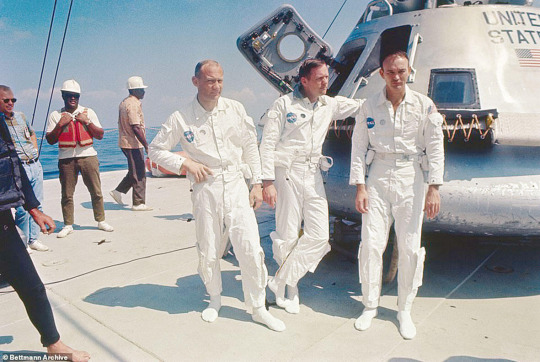
22. Apollo 11 (Todd Douglas Miller)- To disrespect this movie is to disrespect the moon landing itself so...
I do like listening to the Walter Cronkite snippets about "the burdens and dreams of all mankind" and smirking at the idiots who talk about "back when people just read the news without editorializing."
21. Waves (Trey Edward Shults)- I could have done with five fewer shots of people holding each other, and the foreshadowing could be more subtle, but, man, Shults takes some huge swings here, for a more powerful effect than either of his previous films had. It isn't often that a colorist gets a single card in the opening credits, but it makes sense for a film that stands out as much as this loud, woozy piece does. I don't think there's anything as present-tense this year as a character drunk-driving to Kanye West's "I Am a God."
20. Jojo Rabbit (Taika Waititi)- The dissenters of Jojo Rabbit have been pretty uniform in their negativity, and I think their stance has to do with not wanting to be told what to think or feel. (Putting "an anti-hate satire" on the poster has to fire up those haters.) This movie is not subtle or ambiguous, but you know what? Casablanca is a pretty didactic movie too.
Let me back up from the C-word. For me, the film's emotional scenes are better than its comedic scenes, but in either form, Waititi directly engages with a ten-year-old in a way that neither romanticizes him nor condescends to him. That's such an imperfect, transformative age in a boy, and not enough movies are willing to wrestle with how ugly it can be. Roman Griffin Davis is pretty good, but he's spotted by sincere, compassionate performances by Thomasin McKenzie and Scarlett Johansson. It's possible that Johansson has never been better. I totally understand why someone with her sex symbol baggage would resist playing mothers; if I've done my homework, this is the first time she has done it, even though she's a parent in real life. But her maternal scenes here are heartbreaking in their patience, particularly in a scene for which her character "plays" herself and her absent husband. Besides uncorking a more vulnerable part of herself, Johansson nails the performative aspect of being a parent, resisting the urge to make everything a lesson but wanting so desperately to be a positive example for a kid who needs one.
19. Honeyland (Ljubomir Stefanov and Tamara Kotevska)- I greatly prefer the term "non-professional actor" or "first-time actor" to "non-actor" because it's only human nature to act differently when being filmed. The second even a camera filming a birthday party captures you, you start to perform. But in handmade stone houses in rural Macedonia, the subjects are true non-actors. They have no affect because, in all likelihood, they have not seen a movie before. So the way that Hatidze lived over the course of the three years of this project--with purpose, focus, and wisdom--seemed new to me. Honeyland is the gift that I always hope for from documentary and (especially) foreign documentary: a slice of life that I never knew I needed.
18. Under the Silver Lake (David Robert Mitchell)- Andrew Garfield's Sam spends a lot of time on his balcony surveying his apartment complex, staring at a topless woman in a way that recalls Marlowe in The Long Goodbye, one reference point among hundreds. Sometimes he watches through binoculars, sometimes he watches through blinds--blind imagery that shows up over and over again in a movie about voyeurism. Anyway, this neighbor keeps parrots, who we're told as kids can "talk." Not that the animals have any conscious intention with their mimicking, but they replicate what they hear or are taught. The words are signified without any signifiers, so it's hard to even classify the noises as speech. Maybe those noises are everything--a tie to our species that reveals impressive intelligence--but maybe they're nothing--a silly hope of a world that seems less alone. And that subjective interpretation of code is the clearest metaphor in an otherwise elliptical, bizarre, sprawling, sui generis film.
It's messy alright. Some of the threads lead nowhere, but in a movie about order and chaos, that's obviously the point. The scene with The Songwriter--barely any of the characters have names--is over ten minutes and might not have any narrative consequence. But in the moment it's earth-shattering and urgent. And maybe I'm the obvious audience, but I'm not going to complain about anyone taking a dance break for "What's the Frequency, Kenneth?"
17. 1917 (Sam Mendes)- Weirdly enough, a Lauryn Hill line kept bouncing around in my head as I was nervously tapping my foot: "It could all be so simple, / But you had to make it hard." This is a direct story told with impossible technical aptitude. 1917 isn't saying anything new, but have you ever seen a plane crash ten feet away from the camera forty-five minutes into an unbroken take? No offense, but do you remember when we were all impressed that Creed had a five-minute fight in one take? Blimey.
16. American Factory (Steven Bognar and Julia Reichert)- It's a rare documentary that makes its case so gracefully and so forcefully at the same time. The film ends so conclusively that it could be considered labor activism, but it's so fair that the union-busting schmucks are willing to joke around with the filmmakers without obfuscating at all. The obvious forebearer for this sort of boots-on-the-ground snapshot of American labor is Harlan County U.S.A., but American Factory is more staid and less concerned with setting because, you know, this could be anywhere.The Chairman is the best villain since Thanos, and as he looked back on his life while walking around his empty cabana, I had to squint a bit to make sure he wasn't purple.
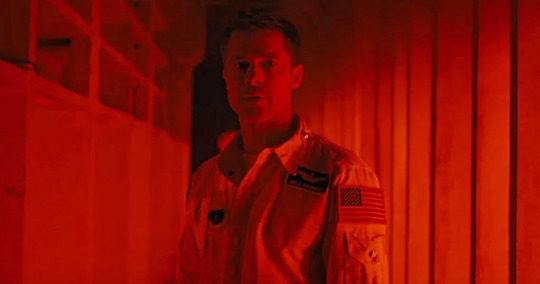
15. Ad Astra (James Gray)- Ad Astra declares so that it can suggest. The opening crawl says that the near future is a "time of hope and conflict," but all we see is the conflict: the pirates on a borderless moon that we've ruined with Applebee'ses, the neglected wife leaving her ring on a table, the voiceover that declares, "I always wanted to be an astronaut...for all mankind and all." This film will take place in four parts--Earth, Moon, Mars, Neptune--and each part will offer unique obstacles to challenge our phlegmatic but confused hero.
But all of that table-setting allows James Gray to explore. There's a scene in which the Roy character uses a belt to pull himself, one tug at a time, deeper into the unknown, and we see the action through the reflection in his helmet as we're watching his face. We're seeing through his eyes but at a remove, and in this moment we're watching him heave himself into emptiness, thinking that the more distant and lonely and absent he gets, the more of a man he becomes. We know that's not true, but we kind of think it is from the movies, and Ad Astra has a happy ending if only because it wants to disprove that notion.
Lots of artistes talk about how they could, without compromise, make grand, big-budget entertainments if they only wanted to. James Gray did.
14. Ash Is Purest White (Jia Zhangke)- In a train on the way to her hometown, the protagonist Xiao casually tells a fellow passenger that she has seen a UFO. Although it comes up later in a sort of magic realism flourish, her statement seemed like a character moment for me. People who see UFOs are either guileless rubes or attention-seeking hucksters, and that's the dance of Tao Zhao's performance. Even after seeing the movie, I can't tell which one Xiao is. Often it changes in the course of a scene. The time when she shows the most agency, firing off her boyfriend's illegal gun to ward off his attackers, results in the time when she is the most helpless, being ordered around in jail. She might confess her ex-con status in a moment of vulnerability, then flake out at the next train stop in an attempt to seize her power back. (It's worth mentioning that there are lots of movies about flaky drifters who don't pay the tab, but few of them are about women.) Even the way that she holds her backpack--frontways--is street-smart and child-like at the same time.
This is the second film that Jia has made with a triptych setting, (Mountains May Depart is slightly superior.) and he doesn't make the flash forwards obvious. He invites the performance's same sort of healthy confusion upon the viewer with the formal elements. I, for one, am willing to get probed by these foreign objects.
13. Toy Story 4 (Josh Cooley)- I questioned a late moment in the film, one of the plottier ones in which Woody goes back to save another toy one more laborious time. When I sighed, my wife reminded me, "He never leaves a toy behind." Toy Story 4 is a dazzling upgrade in the series from a visual standpoint, (I gasped again at Woody lying in a damp, sunny patch of concrete.) but it's more of a reminder of the consistent character development and weight that have been blanketing us for twenty-three years. Pixar isn't reinventing the wheel because it is the wheel.
Sure, the characters are too numerous and separate now. I miss the OG's Rex and Hamm. But for one thing, that rogue's gallery makes it funnier when, say, Buttercup pops up with a joke out of nowhere. And the new characters, particularly Forky the Nihilist, are so lovable that I wouldn't know who to trade. Toy Story 4 is probably the worst of the franchise, but that franchise--especially when its subtext seems to be questioning people who want to stop intellectual property from evolving--might be the best we have.
12. Clemency (Chinonye Chukwu)- In discussing the aftermath of an execution, Alfre Woodard's warden character Bernadine mentions the mother who will claim a prisoner's body, who will follow through with plans for burial. And I realized, to be honest, that I had never thought about how executed bodies are claimed and laid to rest, though obviously those sad practicalities persist. This whole film is a reminder of the numerous costs that arise from a system that is out of time and out of reason.
To that end, every character is fully drawn with empathy. For example, the assistant warden, which could have been a nothing part, has ambitions and fears that give him an arc that shades the protagonist. The Richard Schiff and Wendell Pierce characters make the film about the compromised promises of retirement, but the assistant warden is there to tug us back into law enforcement.
Neon ended up putting this movie on the awards circuit back burner, but Aldis Hodge deserves the world. Although the film piles on one indignity too many for my taste, drifting into miserableism, Hodge's performance has a rare possessive quality. Catatonic in his most crestfallen moments and antic when he clings to hope, Hodge drags the audience along with him. The character is quiet, but every word counts.
11. The Farewell (Lulu Wang)- I was not been more thoroughly charmed all year, especially by Awkwafina, who is a revelation in a tricky role. There are a few scenes that get comedic effect through repetition, and it's telling that the subtitles stop by the third or fourth run-through of a line. The movie assumes you're smart, which goes even further than its piercing emotion.
Shout-out to Mr. Li, who made me crack up every time I saw him. The elderly sort-of-boyfriend is such a common figure in real life, but I'm not sure I've ever seen that character type on screen. I'm not sure I've seen any of this on-screen, and that's the reason the film exists.
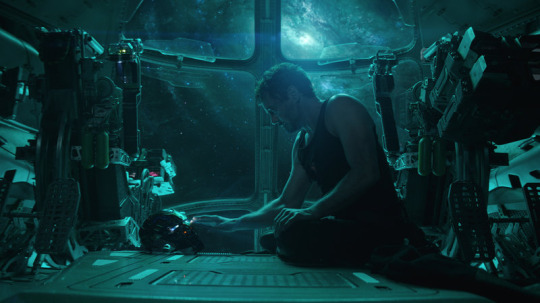
10. Avengers: End Game (Joe Russo and Anthony Russo)- For a guy who grew up in the '30s, Captain America is pretty cool with gay people.
9. Gloria (Sebastian Lelio)- I saw Lelio's original Gloria, the one that he's remaking here, and it didn't do much for me, even though it hit some of the same beats as this one. I wonder what the difference could be...do you think the total commitment of one of the greatest actresses in the world matters?
Lelio documents who this woman is to her children, to her mother, to her ex-husband, to her lover, to her co-workers, and it's by tracking the tiny compromises of those relationships that the viewer gets to see the fully realized her. The cyclical editing of those pieces--sing a disco song to herself in the car, rinse, repeat--ends up lulling the viewer into his role of seeing the complete Gloria. It ends up being a fun, absorbing process. I yelled out loud at Turturro for disrespecting my girl.
Moore, who is in every scene, sells us on these different versions of the character through complete control of her instrument. She lets headphones slump along her body at work. She kneels down toward a street performer in a more maternal way than she ever presents with her actual daughter. She sits cross-legged with her best friend, as if they're little girls. I won't spoil what she does at the end, when she is at her most empowered.
8. Midsommar (Ari Aster)- I love this movie, but, boy, is it a friendship killer if you recommend it to the wrong person. Whether you liked Hereditary or not is a good predictor for your taste, but I think Ari Aster's follow-up is much better: Whereas the unpredictability of Hereditary makes the mysticism of its final fourth seem like a leap that you either accept or don't, Midsommar is driving so hard in one direction that its dread is even more pronounced. (The prologue is so masterfully deliberate and gloomy that it takes a long time for the film to get back to those depths.)
For comparison's sake again, Aster was painting in the colors of hysteria and fractured relationships before, but the new film seems much more biting and vital in the way it depicts modern men and women. I'm thinking of the way Dani excuses herself at the risk of compromising her safety or rationalizes her boyfriend's forgetting her birthday with "Well, I didn't remind him." All of the characters become victims of a misinformed, selfish brand of multicultural tolerance that makes them rationalize evil instead of speaking up, and that acceptance serves the plot way better than the average horror movie's running up the stairs instead of out the door.
For his part, Christian, who seems sympathetic at first, takes ideas, drugs, and even women for himself with impunity. (It's important that he's an anthropology student, and it's more important that his name is Christian.) When he colonizes his Black friend's thesis topic, it might seem like a tipping point, but he was one step ahead in using rules and approval for his purposes. None of the Americans bother to stop him, but that doesn't mean that no one stops him.
7. A Hidden Life (Terrence Malick)-
"The sun shines on good and evil the same."
In the baggy second hour of what might be Terrence Malick's most direct and linear film, martyr Franz Jagerstatter tosses off that line with grace and aplomb, at a time when most of us would have neither to spare. His captors are confused when he denies that his conscientious objection will make any difference in the war or when he doubts that he is more morally evolved than his countrymen. His refusal to pledge an oath to Hitler is a state with no outcome in mind, which the results-obsessed Nazis cannot understand.
In that way he is the perfect Malickian hero, which means he is the perfect Heideggerian hero: a man who sees all planes of existence as equal--or at least equally unknowable to him. As a farmer, Franz observes and acts upon cycles, but he is smaller than Nature and the communion he finds with God there. So when he's torn from his family and daily life to be stuck in a prison, he is separated from that concord further and further. The key, however, is that he is no more or less powerful than before, and that knowledge is what gives him transcendental perspective. He is indifferent in the way that only a saint can be.
Of course, what I'm describing also makes for a passive protagonist, which is why the cross-cutting to his wife Fani is so effective. She is the one who has to shoulder the burden of his ideals, and Valerie Pachner's stolid performance sells that sacrifice. The overall balance comes from the jagged but precise editing, and the production is all the more impressive for retaining the Malick style despite the absence of most of his regular collaborators. (This is the first time since The Thin Red Line that he hasn't worked with Jack Fisk, but there the production design is, crafting a 1940 Austrian town out of nothing and building a network of water symbolism that I don't understand yet.) In fact, the whirling steadicam and the avoidance of artificial light have more of a thematic purpose than ever if "the sun shines on good and evil all the same."
Perhaps the greatest achievement of this film about unjust war is that it made me pray for Donald Trump today. Because if I want to be like Franz Jagerstatter, then I have to believe the light of God shines on him too.
6. Knives Out (Rian Johnson)- A third of the way into this imaginative, absorbing whodunit, I started to talk myself into the surface pleasures of cinema. "So what if it doesn't have much to say; look at these stars going for it with this spicy dialogue and these gleeful twists." Then the subtext asserts itself through a radiant Ana de Armas, and the subtext becomes the text in the final shot. Knives Out is the best of all worlds. Rian Johnson might be the first filmmaker for whom a Star Wars movie ends up being a footnote.
5. Everybody Knows (Asghar Farhadi)- There's a photograph hanging in the library (yes, the stately library) of the patrician family of my childhood best friend, and I'm in that picture. There I am, dressed a bit sloppier than everyone else, near the edge of the frame. Because I was there, as usual, and because they are kind. Everybody Knows is about one of those family friend outsiders, perhaps in a way that no other movie has been. When it's at its best, it's about what those marginal figures can and can't say, can and can't do. The film dips into soap opera territory, but only to sell its message of how secrets beget other secrets. For me, it's another Farhadi hit of approachable, modest conflict that bakes itself into an experience.
4. Marriage Story (Noah Baumbach)- The best divorce movie ever made--by the guy who wrote and directed the former belt holder of the best divorce movie ever made. These luminous lead performances aren't just about saying cutting, hurtful things or reacting to their child's preference for the other parent (or at least the other parent's toys). They're about the internal devastation of realizing you can never take back something you've said. Driver and Johansson each get a chance to sink into one of those moments, and they're joined by a head-tilting, blustery Laura Dern, who gets a Virgin Mary speech that won her an Oscar. And there are jokes!
Underrated aspect of the movie: The son is kind of a dipshit. I like that he just hates math and wants to eat candy, as opposed to the cute prodigies we've seen before in this type of movie. They're fighting over a kid only a parent could love.
INSTANT CLASSICS
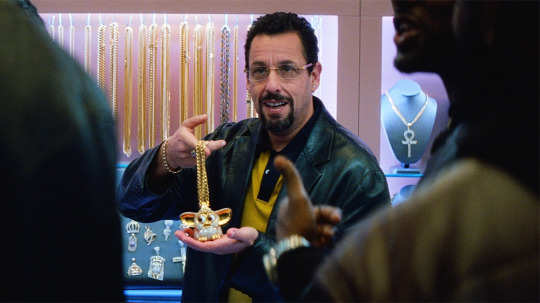
3. Uncut Gems (Josh Safdie and Benny Safdie)- Howard the jeweler lives somewhere in upstate New York, but he has an apartment in the city. It's an apartment that is close enough for him to cab over to his mistress who lives there, but it's far enough away that his family wouldn't bother popping in for a visit. That sort of gap is present throughout Uncut Gems: Family members act differently in the Diamond District than they do at seder, and we first see Howard from the literally vulnerable inside of a colonoscopy, not the animated brio of his tightrope-walking exterior. Of course, the gem of the title is the ultimate division: something pure that the characters are searching for, untouched by the process that Howard, by definition, does. And the film is about how little he can abide by purity.
Until now, The Gambler (1974) was probably the best film of this type, a snapshot of a cursed man who seems to be gambling with forces way beyond the game in question. But Uncut Gems is more pathological, more authentic, more intense, and more decisively realized. By focusing more on character than the Safdie Brothers' other work, it offers a unique depiction of compulsive behavior and implicates the audience in rooting for Howard's (technically unrealistic) parlay. By doubling down on his bets or re-uniting with his girlfriend, Howard thinks that he can reinvent himself and start anew. But like the legacy of the Chosen People the film depicts, like the lines on all of these great New York faces, some things are permanent.

2. The Irishman (Martin Scorsese)-
"It's what it is."
You wouldn't blame someone if he saw the logline and lineup of The Irishman and expected GoodFellas. In fact, this one quotes Scorsese's signature film continually. Instead of slicing onions with a razorblade, old convicts pitch bocce balls. Instead of tracking sumptuously through the Copa, Scorsese's camera wanders through a nursing home. Instead of pistol-whipping Karen's neighbor for getting handsy, our protagonist curb-stomps a grocery owner for shoving his daughter.
But there's a GoodFellas staple that is missing. The first fourth of that crime saga closes as Young Henry, played by Christopher Serrone, gets rewarded for staying mum in court. All of his partners in crime cheer him, and he is told that he learned a valuable lesson (in protecting the family and subverting the law). Then we cut to Adult Henry, played by Ray Liotta now, because Young Henry has learned everything he has to know. The Irishman has no such moment of elevation or revelation. Frank is, crucially, played by Robert De Niro over the course of decades because his fall from grace--if there ever was grace--is too imperceptible for any before-and-after divide. The lessons that he learns are just as corrupting as what Henry discovers: Power comes from insularity. Having power means you don't have to prove it. Organized crime, organized labor, and the political process are all the same thing. A code is all a man has, but all codes have limits. However, Frank's corruption, the selling of his soul, doesn't even bring an Asian-inspired chiffonier or a Janice Rossi sidepiece. Frank doesn't get rich; he jams his hands into a plastic ice bucket at the bar next to his couch. He doesn't get powerful; he has to kill because Russell is too prominent to be in the same town as a hit. He doesn't get glory; even a celebration held in his honor is just an excuse for more influential men to do business. Frank is a tool, and he is trapped in a fruitless silence, at best an accessory at meetings. (De Niro is doing quoting of his own. There's a lot of Jackie Brown's Louis in his shrugs and smirks.)
As boisterous as Scorsese's films can be, he also knows how to use silence. Robbie Robertson's score is weak, but luckily the film goes without for long stretches, including a suspenseful car ride that begins with a treacherous hug and ends with a malignant secret. The best performance comes from Joe Pesci, probably because his stolid stillness matches the overall atmosphere. Of course, the quietest moments correlate to the loneliest moments: Frank touring a cemetery or sitting with a door half-cracked to a complicit viewer. It's the silence of deliberate toil. Like the mobster ripping up carpet in the lake house, Scorsese is on his hands and knees destroying his own myths.
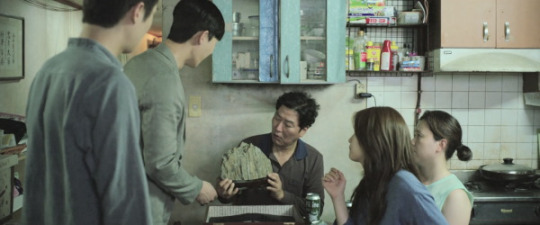
1. Parasite (Bong Joon-ho)- Parasite is Bong Joon-Ho's masterpiece because it distills the worldview and passions that he previously flirted with into a condensed but elaborate statement. In the same way that Mean Streets is perfectly good but feels like a rehearsal for the slow boil of encircling gangster life in GoodFellas. In the same way that Hitchcock played with the impotent everyman voyeur in a confined setting but didn't perfect it until Rear Window.
Like the examples above, Parasite, a true ensemble, is a case of the subtext becoming text. Back in his native country and language, working more or less with realism, Bong is free to take aim at class in a more direct but still wacky way. In all of its crowd provocation--there's so much pleasure in just a suspenseful winding down stairs--the film is destined to be a foreign film gateway drug. But really it just makes we want to take a half-star off my Snowpiercer review since I know Bong can do better now.
2 notes
·
View notes
Text
The Best Films of 2019, Part V
(Sorry for the long wait.)
GOOD MOVIES

43. Luce (Julius Onah)- For every subtle, graceful moment, there's a spelled-out, maladroit moment, but this movie has a lot on its mind regarding race. Naomi Watts is great as a mother whose unwavering support of her son is as admirable as it is foolish, and Octavia Spencer plays a very real type that I hadn't seen in a movie, a teacher who uses her students to validate her own worldview.
The film takes a long time to judge its characters, to the point that the title character could have done none of the things he's accused of (unlikely), some of the things he's accused of (likely), or all of the things he's accused of (unlikely). The dialogue is sometimes theatrical, but thankfully, so is the ambiguity.
42. A Beautiful Day in the Neighborhood (Marielle Heller)- I appreciated the deft touch of Marielle Heller--stuff works in this movie that would look silly on the page--but I wasn't fully connecting. That is, until Chris Cooper got a tear lodged in the corner of his eye and said: "It's not fair. I was just starting to figure out how to live my life." That achieved what it was supposed to achieve.
41. Little Women (Greta Gerwig)- Gerwig takes chances with the structure, and it takes a long time for that gambit to pay off. Once it does though, such as when Jo comes downstairs to see a hearty Beth, which is only there to contrast Jo coming downstairs minutes later to an empty kitchen without Beth, the reinvention pays dividends. I liked whenever the film was winking at the audience, showing its own strings, but that first half was a lot of "Amy, you're Amy, right? And the audience can tell us apart, right, Amy?"
The Chalamet-Pugh scenes, to use a phrase that a Sacramentonian like Gerwig might approve of, just hit different. Especially in the scene that most directly addresses Alcott's division between obligation and personal responsibility, their chemistry crackles. Can someone please cast those two as reporters stepping over each other while trying to crack the same scoop? Please?
40. Dark Waters (Todd Haynes)- In the Todd Haynes filmography, this is an effective if weird entry: He makes the procedural, research-based parts of a legal thriller exciting while the actual courtroom stuff falls flat. And it's a strange challenge for a director with such a sumptuous eye for design to capture the flat textures of Cincinnati office space or the sacky suits of a guy who is consumed by a case. That being said, the film is a work of conscience and compassion. It's no small feat to call out DuPont by name over a hundred times.
The first half moves nimbly. When it works, such as the creative montage that explains Teflon to the audience, it resists the crutches of its genre. But the story suffers from having to compress so many years in the second half. Those broad strokes affect both the supporting performances--only Tim Robbins is able to sell his character's change of heart in limited screen time--and tone. Sometimes the "None of this matters" scenes are right next to the "Maybe I've made a difference" scenes, and it's jarring.
39. One Child Nation (Nanfu Wang)- It's a cool trick for something so handmade and personal to also stand in as a story of a country. And it's as affecting as you would imagine images of discarded fetuses would be. If I sound dismissive though, it's because I don't know quite to do with this. China...sucks?
38. Ford v. Ferrari (James Mangold)- Hard to argue with the craftsmanship of a film that cares so much about its structure on a scene-by-scene level. Ford v. Ferrari is two-and-a-half hours (four hours on TNT every Sunday forever), but, if anything, the forty minutes dedicated to Le Mans could be longer. Josh Lucas nearly tanks the thing with his smugness, but the other performances are fun. My take on why the film is a guide for being a Republican is still charging.
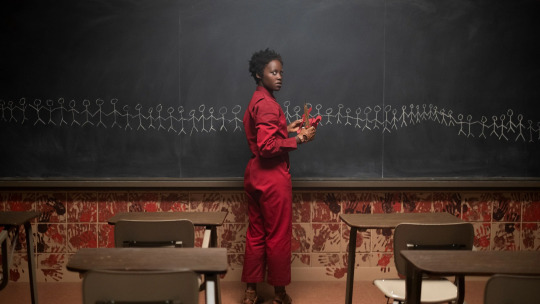
37. Us (Jordan Peele)- Us made $70 million in its opening weekend, which is a lot for a David Lynch movie. It's amazing that a film this artsty and accusatory toward its audience (Us=U.S.) is immensely popular.
The imagery of Us is arresting (and so so funny). Within the first two shots, you know you're in good hands, and my Tumblr feed is going to be full of, say, Elisabeth Moss, whose expressions are the best effect in movies, giving herself a smile with scissors. Scissors that always create a division in their "tethered" subject, that are handled by Freddy Krueger gloves that are clearly an influence on Jordan Peele, that make construction paper cut-outs that mirror the bougie family decal on the back of the Wilson Family's station wagon. This device is a thought-out visual component. But Us is all too often a subtext in search of a text. When we really start to unpack the shadow people, they might not even make literal sense. I say this as I plan a second viewing that the movie deserves. On one hand, I admire Peele's search for a metaphor for political division or homelessness or late capitalism. On the other hand, a metaphor for everything is a metaphor for nothing.
36. Richard Jewell (Clint Eastwood)- Like most Eastwood directorial efforts, things are a little too neat and fixed in the setup: This character saying something a bit too on-the-nose and biographical, those characters probably not being in the same place at the same time. And the female characters, especially Olivia Wilde's rapacious, promiscuous Kathy, would have felt out of place thirty years ago, let alone now. There's barely anything on the page for her, and, to be honest, I don't think she does much with what she was given.
Once the film settles into what it's actually about though, the drama is graceful and potent. The attorney-client relationship is specific and interesting, and in a less loaded year, Paul Walter Hauser and Sam Rockwell would be clearing their mantles. Hauser, in particular, is great, free of any of the vanity that might go into making Jewell more perceptive or self-aware.
35. The Peanut Butter Falcon (Tyler Nilson and Michael Schwartz)- Derivative of even something like Mud from a few years ago, poisoned by an abrupt ending, but ultimately sweet as hell. Shia and Dakota play off each other with Movie Star fireworks, so the film kicks into a different gear when they're together. The scene in which LaBoeuf stands at the Salt Water Redneck's screen door is a heartbreaker.
34. Pain and Glory (Pedro Almodovar)- A little less formally inventive than I was expecting, Pain and Glory is mostly good and sometimes great, especially in the heartbreaking Federico sequence. In another mother-son story, one that brings up the word "autofiction" without prompting, Banderas is even styled to look like Almodovar. This might be his first "old man" role, and he wears it well.
33. Where’s My Roy Cohn? (Matt Trynauer)- The Donald Trump section, the one that all of Cohn's situational morality and empty power-grubbing had been leading to all along, is illuminating because it goes deep into specific deals. (And because the relationship is recent enough for the interview subjects to have first-hand knowledge.) I wish that Trynauer had slowed down that much elsewhere--especially to get to the bottom of the frog collection. But if the object is to get you to go, "What an asshole," then mission accomplished.
32. The Lighthouse (Robert Eggers)- Eggers lays the doubling on pretty thick in the last half-hour, but he goes to great lengths to make this like nothing you've ever seen or heard before otherwise. He's a filmmaker who cares deeply about the composed image on a shot by shot and possibly a frame by frame level. The Lighthouse was less thematically rich than its predecessor, but I'm pretty sure I felt as confined and unnerved (and as tickled by the salty dialogue) as I was supposed to.
31. Amazing Grace (Sydney Pollack and Alan Elliot)- Amazing Grace is one of the best reviewed movies of the year, in part because no one is going to say that listening to Aretha Franklin sing is a bad experience. It's not. But she's stationary as a performer, and I would be lying if I said that the movie didn't get tedious. In its best moments though, one of which is Aretha's dad wiping sweat off her face while she ignores him and plays the piano, it's high, high art.
30. The Inventor: Out for Blood in Silicon Valley (Alex Gibney)- A typically solid Gibney effort: never boring, articulate in its aims, poised to expose fraud for the public good. The film builds quite a bit of momentum as it gauges Elizabeth Holmes on the scale of American showmanship and Silicon Valley's fake-it-till-you-make-it ethos, and its strangest moments are its best. (See: The C.E.O. and C.O.O. giddily jumping on a bounce house because one of their two hundred tests got approved by the FDA.) I like that no one explicitly comments on Holmes's looks, using words like "captivating" or "presence" instead, letting her undue influence on men hang over the proceedings the same way it did in real life. There's a lot left unsaid about how she might have been held back but then pushed forward, underestimated until she was overestimated, because of the lack of women in her field.
At the same time, the film repeats itself and ties itself into knots by insisting that Holmes is a complicated figure. She's a person so driven by a desire for greatness that she can't listen to reason or admit defeat. Are we sure that's revolutionary or unique?
29. Dragged Across Concrete (S. Craig Zahler)-
A) All of S. Craig Zahler's movies are above average in execution and downright special in aspiration.
B) All of S. Craig Zahler's movies are too long.
C) If S. Craig Zahler's movies were not long, they would not be special.The guy keeps introducing characters and threads, but each one is interesting, and I keep rolling with him. (Until the Jennifer Carpenter subplot, which is ten minutes of emotional manipulation.) That same critical tangle extends to the idea of whether or not this movie endorses the racism that it depicts. I thought it did until I didn't, and maybe that wishy-washiness--dingy, dingy wishy-washiness--is what I'm supposed to feel.
28. Honey Boy (Alma Har’el)- Honey Boy isn't much of a movie, but it is an exorcism. Especially in the Lucas Hedges rehab arc that we've seen a million times, the story is thin. The film's reason to exist is emotional catharsis though, and it has that in spades. It's worth seeing for the traumatic three-way phone conversation alone.
Hedges banks another good performance in what is basically a Shia impression: falsely gruff voice, t-shirt collar in mouth, crew socks peeking out of combat boots. But what LaBoeuf himself is doing is a force of nature. His performance in American Honey was my previous favorite, and he taps into the inverse of that charisma here: seductive in the former, repellent in Honey Boy. Most people can play insecure motormouths, and most people can evince pain. But to play a person who talks non-stop as a coping mechanism for pain, and getting across to the viewer that even the character knows he's not good at such a thing? Those are some shades of gray.
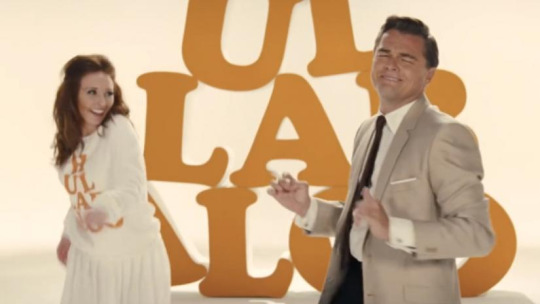
27. Once Upon a Time...in Hollywood (Quentin Tarantino)- Tarantino's best film, Inglourious Basterds, is gauged for maximum suspense and audience involvement. This one, which is one of his worst on this first viewing for me, is made entirely for himself. I appreciate that artistically, but the film never stops--especially in the clunkily paced middle--indulging itself. Oh, I get it: It's a film about growing older and dealing with possible obsolescence, but the nuts-and-bolts storytelling is too digressive for me.
That dilly-dallying is the point, of course, as the film attempts to hang on to a dying moment, luxuriating in its painstakingly recreated setting and hanging out with men's men played by actors who are at their absolute peak of Movie Stardom. It's a Tarantino film, so it's not without its sublime pleasures. Hell, I'll go back just for that montage of the neon signs turning on.
26. Her Smell (Alex Ross Perry)- Grating in a way that Alex Ross Perry's films have not been before and redemptive in a way that his films have not been before. Over the course of five mammoth real-time scenes--Perry cites Steve Jobs as a structural influence--the viewer is dragged through scuzzy, abusive ugliness right to the authentic final line. It's a rewarding experience that I never want to experience again.
More than anything else, the film is an additional exhibit in the case that Elisabeth Moss can do anything. She shined in Perry's Listen Up Philip and gets a similar long zoom here to showcase ten emotions at once. She plays the part of Becky Something like a glass on the edge of a table: that delicate and precarious, useful but with the potential for harm. She screams, she cries, she sings, she plays guitar, she plays piano, and she could probably float if the screenplay really required it.
25. Transit (Christian Petzold)- The only thing I knew about Transit going in was that it took place in an indeterminate time period. And that one studied aspect of the film, the ideological rootlessness of the fascists responded to with a papers-focused isolation, is what powers everything. Manohla Dargis aptly called it "temporal dissonance," and it adds real teeth to the film's allegory. The second half becomes more contemplative and less literal though, and I think it's less urgent as a result. I didn't know quite where Petzold wanted me to go in the final moments. But the stateless throng of people waiting for their number to be called at a consulate? I know what that is supposed to make me think about.
24. Mary Magdalene (Garth Davis)- I didn't like Garth Davis's last film, Lion, because the protagonist seemed listless and dumb and weak. Turns out, Jesus Christ and Mary Magdalene are upgrades. There's a feminist bent to the proceedings, thanks to its two female screenwriters and a focus on the agency needed for a woman in 33 to spurn marriage and family to follow a whispery firebrand. Phoenix's performance is uneven, but, especially when he passes out bringing Lazarus back to life, he does a great job of showing how exhausting it must have been to transcend this world. The film kind of comes across as a greatest hits of Jesus, but so do the Gospels.
23. Sword of Trust (Lynn Shelton)- Sword of Trust, as thin and bite-sized as it is, carefully parcels out backstory and deepens as it goes. Without really forcing the issue--Lynn Shelton never does--it becomes a timely and witty story about the consequences of a society relativist enough to give consideration to even the most absurd viewpoints. Toby Huss as Hogjaws is a Best Supporting Actor nominee for me, and I am not kidding at all.
0 notes
Text
The Best Films of 2019, Part IV
Part III, Part II, Part I
PRETTY PRETTY GOOD MOVIES
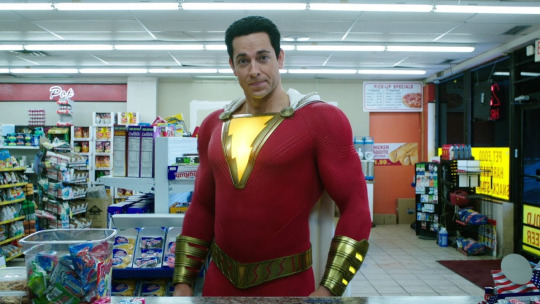
62. Shazam! (David F. Sandberg)- One of the most comic-booky movies to come around in a while in the sense that it seems to be in fast forward for the first third, using shorthands because it has too much story to tell. I am sad to report that Shazam! has no Movie Stars in it, and I didn't realize how essential those were to the superhero genre. There is a cagey standalone quality to its modest bets though. I like that it's anchored in a real place and isn't afraid to be a little too scary for kids. I would see it mostly as a product of potential though, for a funny Jack Dylan Grazer, for the filmmakers, and for the studio. As a student of weird billing, I have so many questions about Adam Brody getting awarded fifth lead for a bit part.
61. Fighting with My Family (Stephen Merchant)- Dwayne Johnson as producer feels like the auteur here, since the formulaic story has more to do with his combed-over, please-everyone persona than with Stephen Merchant's more messy, improvisatory style. I couldn't care less about the time spent on Jack Lowden's brother character, but I was impressed with the physical part of Florence Pugh's performance. This is a movie you've seen a hundred times, but it hits most of its marks skillfully.
60. Spider-Man: Far From Home (Jon Watts)- This is a movie in which a spurned tech innovator uses drone projectors to stage a battle in which he defeats an elemental water monster to save Venice. The best sequence is one in which a boy tries to trick his friends into letting him sit next to the girl he likes on a flight.
59. John Wick: Chapter 3- Parabellum (Chad Stahelski)- What a criticism it is to claim that the filmmakers give in too much to fanservice, especially since I don't know what that word means anymore if something like this is the monoculture. So they gave us, the audience, what we wanted, and I was upset that it was two hours and ten minutes? Seriously though, have you ever eaten too much ice cream?
58. Fyre (Chris Smith)- An interesting yarn that gets at the foolishness of Internet influencing better than anything else that I've seen. I was surprised by how distant many of the subjects seemed, as if only the Big Bad Billy was responsible for any misleading. And I was grateful that, despite the level of criminality on display, it was still as funny as the tweets were at the time. The film lacks shape though, and it would be nice to have somebody smart on hand to answer questions.
Can someone explain to me why it's so important that the island used to be Pablo Escobar's? Why should I want to be like Pablo Escobar?
57. Leaving Neverland (Dan Reed)- Part 1 works because of the striking similarities in the parallel stories, as well as the subjects' perspicacious understanding of their own emotions and childhood psychology. So Part 2 gets extremely frustrating when these men, who have already proven how articulate they are, seem puzzled by the obvious psychological problems they have as adults.
56. Diane (Kent Jones)- This movie is kind of good when it's purely slice-of-life, before it declares what it is. It's very good once it declares itself as a routine of self-flagellation, a sort of Raging Bull for women with multiple recipes for tater tot hotdish. It's a little less good when it speeds up and goes back on that thesis near the end.
For the record, I think Mary Kay Place is fine. I don't get the critical adoration.

55. Rocketman (Dexter Fletcher)- If the choice is Bohemian Rhapsody or this, then I'll take this every time. Unlike the former, Elton John's life doesn't present an obvious high point in the second half or easy conflict for the first half. As a result, the relationships within John's family seem broad with manufactured conflict. (His birth father's hardness isn't that far off from Walk Hard's "wrong kid died.")
But there's an authenticity here that's refreshing, a respect to the unique friendship between Elton and Bernie and a respect for the transformative power of the music. That sincerity extends to Egerton's generous performance, which nails the self-effacing Elton John smile. So there are some biopic structural problems that can't be helped, but if only to admire the '80s fits that Elton gets off, attention must be paid.
54. Triple Frontier (J.C. Chandor)- A useful example for differentiating between tropes and cliches of the action drama genre. For someone who gets less amped than I do for dudes meeting in a shipping container to have a conversation about how "now is the time to get out," it's probably full of cliches. For fans of hyper-masculine parables about getting a team together (that are also sort of meta-commentaries on their lead actor's fallen star), it's full of tropes.
53. The Lego Movie 2: The Second Part (Mike Mitchell)- The plot is nearly incoherent, and the sequel isn't really satirizing anything like the first one was. But the jokes come at a Zucker-Abrahams-Zucker clip. A character in a car chase saying, "It's like she knows my every move" before a cut reveals he's been using turn signals? That's some Frank Drebin stuff.
52. Long Shot (Jonathan Levine)- Jonathan Levine has carved out an interesting directorial space for himself, with a career far different from what I imagined when I saw and loved The Wackness, a film to which I'm a little afraid to return. Levine is making, at the highest level possible ($40 million budget?), the types of movies that we claim don't get made anymore. A one-crazy-night Christmas comedy, an adventure comedy, and now a political romantic comedy, all with top flight Movie Stars. Long Shot seems like a rare opportunity to put Seth Rogen and Charlize Theron together and do something special, and what we come out with is...cute. For every good decision the film makes--what a supporting cast, all playing rounded characters--it makes a bad one--leaning too heavily into Rogen's patented "I don't really know what we're yelling about" delivery. The music is uninspired, but the presidential satire is pretty clever. The rhythm of the film is jagged and doesn't really cut together, but the script is very fair to the Theron character. Even in the general tone of the film's politics, it declares a few ideals, but those positions are still too neutral and obvious. I had a good time, but in a more capable director's hands, this experience wouldn't feel like math.
51. Isn’t It Romantic (Todd Strauss-Schulson)- So frothy that it almost doesn't believe in itself, especially near the end, but I found myself laughing a lot. Regarding the gay best friend, I'm very interested in the space of politically incorrect humor that is acceptable only because the work has built up self-awareness in other areas. That's a difficult negotiation, but this movie balances it.
50. Yesterday (Danny Boyle)- There's one twist that stretches the moral center of the film, and two minutes later there's a twist that's probably just a bridge too far in good taste. Other than that, this is a really cute Richard Curtis script, and it's nice to hear "Hey Jude" on movie speakers.
49. Ready or Not (Radio Silence)- Short and spicy, despite one or two too many twists. I'm in the front row of the Adam Brody Revival, but I appreciated the movie more as an exercise in the paranoid misery built into wealth. I wish I could have written the line down, but Alex says something like, "I didn't realize how much you could do just because your family said that it was okay," and that's the whole film. If you can, see it without watching the trailer first.

48. The Laundromat (Steven Soderbergh)- Mary Ann Bernard is a Steven Soderbergh pseudonym, but what if he did hire an outside editor? What if someone saved him from himself? It's hard to believe that Meryl Streep is the heart of the film--if the film's thesis is "The meek will inherit the Earth?"--if we go on a twenty-minute detour to an African family and a ten-minute detour to China. I laughed quite a bit, and I admire the audacity of the ending. But this is a movie that knows what it's about without knowing how to be about it.
47. High Flying Bird (Steven Soderbergh)- As a person who can cite most NBA players' cap figures off the top of my head, I should love High Flying Bird, a movie about a sports agent who tries to topple the system during an NBA lockout. Instead I liked it okay.
It takes an hour to kick into high gear, but once it does, some self-contained scenes are powerhouses, and the writer of Moonlight was always going to provide an emotional kick that is sometimes absent from Soderbergh's work. Like Soderbergh's Unsane from last year, High Flying Bird is shot on an iPhone, an appropriate form given that the execution is a do-it-yourself parable that takes place mostly inside. Soderbergh is a man who has always tried to trade the ossified system of moviemaking for experimentation, so most reviews have pointed toward the meta quality of capturing a character doing that same thing in another medium. Like most of his post-retirement work, however, I find myself asking one question: "Would anyone care if this were made by another director?"
46. Piercing (Nicolas Pesce)- Good sick fun with a taste for the theatrical. I saw twist one and twist three coming, but twist two was ingenious. It ends the only way it can, which is okay.
45. Booksmart (Olivia Wilde)- At first the film is hard to acclimate to, stylized as it is into a very specific but absurd setting, counteracted by a very specific and realistic relationship. The music cues are all awful until the Perfume Genius one, which is so perfect that it erases the half-dozen clunkers.But it's smartly funny, funnily warm, and warmly smart. The screenplay does some clever things with swapping the protagonists' wants and needs at crucial times. Molly will have an obvious drive that overrides Amy's fear, and then a few scenes later, there will be an organic reversal.
44. Joker (Todd Phillips)- Joker presents more ideas than it cogently lands. I don't disagree with Amanda Dobbins's burn that it feels more like a vision board than a coherent story. Still, its success kind of fascinates me. This dark provocation, shot on real locations, has way more in common with Phoenix entries like You Were Never Really Here than it does with the DCEU. In fact, the comic book shoehorns feel like intrusions into a story about a guy who likes to Jame Gumb skinny-dance.
Dunk on me if you want, but I think it's most eerie and affecting as a portrait of mental illness. Whereas Joker is a criminal mastermind in Batman lore, this is a guy helpless enough to scrawl into a notebook, "The worst part about having a mental illness is pretending to people that you don't." And that idea gets borne out in a scene in which he's pausing and rewinding a tape to study how a talk show guest sits and waves like a regular person. It's rare enough to see a person this mentally ill depicted on screen; it's even rarer to see someone this aware of his own isolation and otherness.
0 notes
Text
The Best Films of 2019, Part III
Part I is here. Part II is here.
PRETTY GOOD MOVIES

80. Rolling Thunder Revue: A Bob Dylan Story by Martin Scorsese (Martin Scorsese)- Can one put a star rating on Bob Dylan, with renewed purpose, belting out "Isis" in a head and shoulders close-up to New Hampshire teens? What about a naked moment when he and Joan Baez simultaneously realize they should have married each other, and he, for maybe the first time, has nothing to say? As a Dylanologist, I'm glad that this footage from an under-reported period saw the light of day.
You can start to think about stars when Martin Scorsese, my other dad, does everything he can to complicate and ultimately undermine that footage with his contributions. I appreciate that he uses his documentaries to experiment and chart his passions, and I think that I get what he's doing with his present-day chicanery, but it does not work for me. Shout-out to when Bob Dylan claims, of one of Scorsese's fake people, "He seemed to need enemies. Even when there weren't any." I felt that.
79. Serenity (Steven Knight)
Djimon Honsou: Lawful Good
Jeremy Strong as "The Rules": Lawful Neutral
Anne Hathaway: Lawful Evil
Diane Lane: Chaotic Good
The Kid: Chaotic Neutral
Jason Clarke: Chaotic Evil
The Bartender: Lawful Neutral
Matthew McConaughey: True Neutral
Me, Believing Almost Sincerely That This Is a Good Movie: Chaotic Neutral
78. Atlantics (Mati Diop)- It's plenty effective as a window into a patriarchal society I wasn't familiar with, but Atlantics doesn't ever match the heights of its exquisite opening. At the risk of getting banned from this website--and I do realize what I'm implying here...not enough happens.
77. Birds of Passage (Ciro Guerra and Cristina Gallego)- After enjoying the formal invention of Embrace of the Serpent, I was interested to see Guerra and Gallego's spin on a well-worn genre like crime. So I was surprised to see how conventional Birds of Passage was. The indigenous Colombian rituals provide some color and grandeur, but otherwise this is a rise and fall that I've seen before, complete with a hothead character that threatens the whole operation. Perhaps my favorite part of crime movies, the alluring sinful fun that ropes the viewer in and makes him complicit, is nowhere to be found.
76. The Last Black Man in San Francisco (Joe Talbot)- I admire Joe Talbot's debut more than I like it. It's straightforward in its ideas of African-American and masculine performance, and it boils its essence down into a really effective scene near the end (on the bus). It does get tedious though. The protagonists' goals keep changing in a way that makes it seem like the film is overcompensating for how simple it actually is.
75. Running with Beto (David Modigliani)- Beto O'Rourke is both inspiring and goofy, able to get me to look to the stars and roll my eyes within the same breath. This movie is pretty standard for its genre, but its greatest strength is getting us to see that all people present those contradictions on an individual level, while most people, if we're talking about blue and red states, are the same collectively.
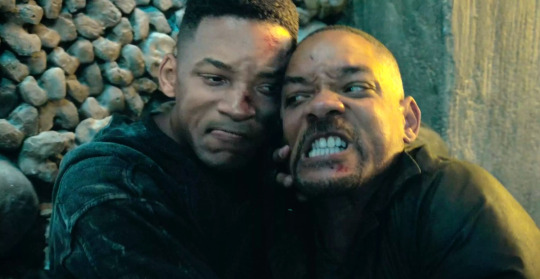
74. Gemini Man (Ang Lee)- Ang Lee treats Gemini Man like a test reel for 3D high-frame rate presentation, and I think I would have liked the film much less if I hadn't enjoyed the bells and whistles. (Find me in the club and ask me about the HDR--I can go deep.) You could read the film as a comment on Will Smith's Movie Stardom: We're the product of our experiences, and up-and-comers lack some of the character/baggage that Smith brings even if those imitators can approximate his bluster. (The fact that the film is a commercial failure adds another layer. Perhaps the cultural bridge that Smith created is no longer necessary.)
But you'll notice that none of that stuff is dealing with the text, which rarely does the unexpected, especially when it comes to the mustache-twirling Clive Owen character. The film pointedly avoids a romance between Smith and Mary Elizabeth Winstead, and that's another absence that I'm pretending is a plus.
73. The Hummingbird Project (Kim Nguyen)- At first, the film has trouble selling itself, almost underplaying how quixotic the characters' plan to beat the stock market is. Once it settles in after a few false starts, it expands into a story about how precious time is in general, an idea that Jesse Eisenberg sells in his sympathetic performance. The other characters don't fare as well. Skarsgard's foil is comparatively static and dull, and a dialed-up Salma Hayek makes this a more external, obvious picture than it should have been. But there are long stretches that I like.
72. Escape Room (Adam Robitel)- I was exhausted in a good way as the movie rocketed through its setup, showing us the backstory of half of its characters while bypassing the rest. I was exhausted in a bad way by its fourth ending. Basically though, this movie does its job. And I'm glad that some of these thrillers are still envelope-pushing PG-13's.
71. Late Night (Nisha Ganatra)- There's a preposterous scene swinging into the third act that I just cannot accept or get behind, and it introduces a wave of Serious Scenes of People Getting Real with Each Other. But I haven't seen such a distilled juxtaposition of second-wave feminism and third-wave feminism before, let alone in a comedy. Some solid jokes. And John Lithgow playing piano while feeling bad about himself!
70. Non-Fiction (Olivier Assayas)- Non-Fiction is a sign that Assayas, always prolific, is entering the Woody Allen Zone. That is, he, a filmmaker capable of great formal beauty, has left behind formal rigor for a moderately funny tale about pseudo-intellectuals having conversations that would have been provocative five or ten years ago. 90% of the film depicts infidelity, but it isn't really about infidelity.
Just as every latter-day Allen picture has two or three immaculate jokes or inward moments, Non-Fiction, despite its lack of ambition, has some perfect Assayas inter-textual flourishes. The Selena character bemoans the disposable nature of the TV show she works on, but Assayas drops us into one of the show's wintry, over-exposed shoot-outs as if to capture a genre he'll never fully pursue. He also writes a joke in which Selena, played by Juliette Binoche, claims that she'll try to talk Juliette Binoche into recording an audio book.
69. Crawl (Alexandre Aja)- I guess you could say something negative about this movie, but you would also have to mention that ol' girl lets off a full clip from inside the gator while it is chomping her arm off. So it pretty much has that Academy Awards category sewn up.
68. Long Day’s Journey Into Night (Bi Gan)- as Chinese Jerry Seinfeld once said, "Why don't they make the whole movie out of the hour-long unbroken 3D take?"
67. The Art of Self-Defense (Riley Stearns)- The Art of Self-Defense is a film of two halves--in a way that, actually, Riley Stearns's previous film Faults was. For me, those two halves, one being slow and pre-ordained, the other being wild and unpredictable, are too extreme on either end. The vagueness of the setting is a weapon that goes a long way in unifying those parts though.
Even if I couldn't get down with the silliness, The Art of Self-Defense is worth checking out for Alessandro Nivola's career-best performance. The movie is about performative masculinity, so he has the challenge of playing a sort of confident monolith while also being totally specific. He's everything you would imagine a karate instructor to be, but he also takes his glasses out of their case in a way I've never seen before.
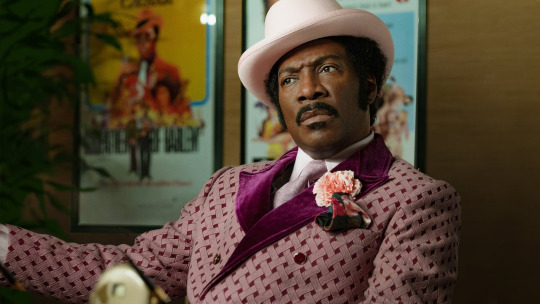
66. Dolemite Is My Name (Craig Brewer)- Keep in mind that I couldn't make it all the way through Dolemite proper, so I'm not the intended audience for this film's "let's put on a show" awe. The structure is notable: It starts with Rudy Ray Moore as a failure who has tried everything, crests past the shooting of his movie, and uses that completion as a plot point, only to focus on the distribution for the third act. That is, the screenplay breathes new life into the plot right when it needs it.
Eddie Murphy's best performances always seem like regretful commentaries on his own relationship with the audience, (I'm picturing the final speech of The Nutty Professor.) and he follows suit here. Even better is an effete Wesley Snipes as the too-cool-for-school D'Urville. Despite all of the talent involved, however, the thing just isn't funny, and it's least funny in the comedy club scenes that are supposed to sell us on Rudy Ray Moore's genius. If it's not supposed to be funny, then why populate the movie with five comedic supporting actors?
65. Harriet (Kasi Lemmons)- History classes could do a lot worse. Like a history class, the film has so much ground to cover that it has to make choices for pacing, and even then it still feels like a greatest hits. It does have a surprising, brazen edge though, and it's more spiritually curious than I was expecting.
Kasi Lemmons leans in to the mystical side of the story, using Tubman's spells as conversations with God that give her the confidence that she needs. The device is a double-edged sword though: What distinguishes and others Tubman, what makes her the chosen one, is also kind of passive and out of her control.
Speaking of out of control, Joe Alwyn plays the slaveholder who ain't gonna be as nice as his pappy was. "Seems to me things have gotten a little too easy 'round these parts."
64. Motherless Brooklyn (Edward Norton)- Like Edward Norton, Motherless Brooklyn is sincere and smart and shows its work. Also like Edward Norton, it sort of tires you out after a while with how hard it's trying. I respect the ambition--the film tangles itself in race and jazz and urban planning and makeshift families--but by the third or fourth time that the hero blacks out while getting roughed up, the film reveals that it can't quite thread the needle between noir pastiche and noir cliche. It's satisfying enough as a mystery in general.
63. The Two Popes (Fernando Meirelles)- I'm the target audience for 21st century papal fan-fic, and even I started to zone out during the flashbacks. Jonathan Pryce sort of disappears, but I think this is the first Netflix prestige project being judged on a curve.
0 notes
Text
The Best Films of 2019, Part II
Part I is here.
ENDEARING CURIOSITIES WITH BIG FLAWS

106. Alita: Battle Angel (Robert Rodriguez)- I'm not looking at a list of films with budgets over $175 million, but I guarantee this is the one with the lowest stakes. It concerns a cyborg who tries to uncover the identity that the audience knows she has all along, and it takes place on three sets. I was intrigued by the prospect of Robert Rodriguez directing a James Cameron production, since the former uses effects to be lazy and the latter uses effects to challenge himself. Alita is more of a Rodriguez movie in that regard. Although it looks slightly better than those pictures he used to make in his backyard, it ain't by much.
105. The Upside (Neil Burger)- As good enough as movies get, good enough right up to the childish screenwriting contrivances of the third act. ("I guess he knows about wheelchairs now, so he gets a job at a wheelchair factory? Or maybe it's his own factory? I don't know--I'm still spitballing in this production draft.")
Queen Nicole is criminally underserved though. Have you read that story about how Keanu Reeves's friend forged his name onto the contract for The Watcher, but Keanu didn't want to go through a prolonged legal battle, so he just showed up despite the fraud? Surely it's got to be something like that. Or maybe she was under the impression her character was still being fleshed out, but she got there and saw that nothing has been changed since the last draft? It's just like, "Yvonne looks stern. More to be added." I know for sure that no one told one of the greatest actresses in the world about the part in which she's supposed to be a good dancer. She would have prepared.
104. How to Train Your Dragon: The Hidden World (Dean DeBlois)- HtTYD is still the most visually experimental animated franchise. For example, DeBlois hazes the image when a character is looking at another through a torch, there's a five-minute wordless sequence of dragons falling in love, and a lot of work has been put into crafting peach fuzz. I also appreciate that these films retain consequences. Hiccup has a prosthetic leg, and his dad is still dead.
Narratively though, everything feels like a holding pattern, a brand extension that doesn't offer real stakes or real laughs. (Fishlegs has a beard now. That's his character development. That's it.) Even if The Hidden World offers an ending of sorts to the trilogy, it's a story of retreat/escape that can't help but feel like a sideways step from its already disappointing predecessor. My daughter tuned out and got really restless with about twenty minutes left.
103. Greta (Neil Jordan)- Such a boilerplate thriller that I was actually predicting the dialogue at points: "Miss, I'm sorry, but there's nothing we can do if she's just standing there across the street. She's not breaking the law." There is one notable thing that happens though. In a scene at a church, Huppert makes the Sign of the Cross incorrectly. As an actress, kind of negligent. As a French person, pretty exquisite.
102. Anna (Luc Besson)- The timeline-jumping didn't work for me, but without it, I don't think there's much notable about the quadruple-crossing here at all.
The awe-inspiring restaurant fight sequence is the film's saving grace; I'm awarding an extra half-star for its slashing-throats-with-plates viscera.
101. Captain Marvel (Ryan Fleck and Anna Boden)- Was I supposed to know what a Skrull was before this? Lee Pace and Djimon Hounsou show up playing Guardians characters, so I think I was supposed to connect more of the sci-fi dots of the first twenty minutes than I did. All of that inter-planetary stuff was tough sledding for me, and I preferred the Elastica music cue and Radio Shack jokes. As it turns out, especially in this genre, it's dramatically frustrating to go on a hero's journey with a character who doesn't know who she is.
It was nice to see Samuel L. Jackson, with convincing de-aging effects, get a real arc in one of these movies, rather than just posing here and there. Brie Larson does enough posing for the both of them.
100. Frozen II (Chris Buck, Jennifer Lee)- Frozen begins with sisters being separated after one injures the other. It plays for keeps from minute five. Frozen II, whose smaller stakes are felt in the one-or-so location, B-team songs, and forgettable new characters, never feels as real.
99. Aladdin (Guy Ritchie)- Even if the songs still bang and Nasim Pedrad is very funny, Aladdin feels as cynical and--don't say it, don't say it--unnecessary as all of these live-action remakes do. I'm looking forward to the animated remakes of the live-action remakes, which might figure out a way to reincarnate Robin Williams. One can dream, even cynically.
98. El Camino: A Breaking Bad Movie (Vince Gilligan)- Finally, the TV movie--and no shade, but this ending we didn't ask for is definitely part of the TV movie tradition--that answers a burning question for Breaking Bad fans: Was Jesse ever interesting by himself?
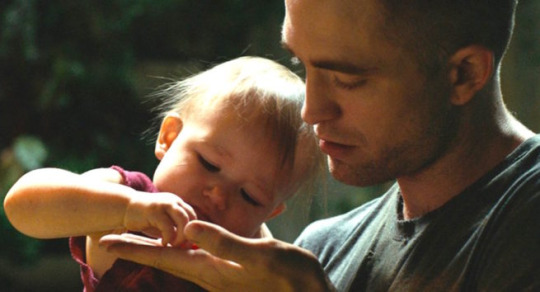
97. High Life (Claire Denis)- As uncool as it makes me, I have to admit that I just don't care for Claire Denis's aesthetic. Knowing nothing going in, I was captivated by the mysterious first half-hour, but once the film started to explain itself, it seemed like a B movie with more ponderous music. High Life is effectively claustrophobic, but I found myself "yes-anding" most of it. Yes, for example, space is lonely, as I've learned from every other movie about space.
96. Where’d You Go, Bernadette? (Richard Linklater)- From the get-go, this movie doesn't work--structurally, tonally--but the miscalculations of Linklater and Blanchett and especially the mawkish music don't have enough consequence for the film to even fail on a noteworthy level. It's not unpleasant. You just laugh sparingly and think, on the way out, "I don't think she loved her daughter as much as she said she did" or "Get to Antarctica twenty minutes earlier or twenty minutes later."
Linklater, an inestimable talent, has added an entry to his filmography that might as well not exist. Making movies, especially adaptations of epistolary books, is hard. I'm being too understanding of that or not understanding enough.
95. Dumbo (Tim Burton)- Just as Dumbo begins to take chances--fashioning itself as an anti-corporate parable with Keaton playing a Disney-esque "architect of dreams"--it settles back down to its own low expectations. Expectations that come from the storytelling and characterization and not the production design, which seems grandly practical except for the CG [rolls up sleeves, adjusts glasses, tightens shoes] elephant in the room.
Of the performances, Farrell comes out on top, displaying Movie Star confidence despite very little to work with. (Can a World War I veteran who lost his arm and his wife be allowed a bit more pain?) It gives me no pleasure to dunk on child actors, but both of the kids seem to be reading their lines, and their monotones nearly sink the movie at the beginning.
94. Echo in the Canyon (Andrew Slater)- A nice enough introduction to the scene, but Jakob Dylan's constant presence as an interviewer and performer turns it into a vanity project. The film shuffles among talking heads interviews, prep for an anniversary concert, and an anniversary concert, and I'll let you guess which one of those is interesting. The access that the filmmakers got is impressive, but if a person didn't participate (Carole King is the obvious one), the filmmakers just pretend he or she didn't exist.
93. Diamantino (Gabriel Abrantes and Daniel Schmidt)- I like the notion of someone so specialized in his profession that he has a child-like understanding of the outside world, and Carloto Cotta sells the innocence of the title character. (The Donna Lewis needle-drop killed me too.) But too often this film feels as if it's focusing on sheer weirdness over satisfying narrative. Cult classics are fine, but you should try for the regular classic.
92. Ma (Tate Taylor)- There are some cool ideas here--the innocent entrees that technology provides, the way the movie earns its R rating. But the script needs a few more passes for everything to congeal past the silliness, especially with regard to the hammy flashbacks that attempt to provide motivation for the Ma figure. I respect the attempt to humanize a monster, but she would be more scary if left opaque.
91. Bombshell (Jay Roach)- The films that try explicitly to comment on our current social climate are never the most successful ones, especially if their internal politics are this muddled. The film takes great pleasure in implicating the toxic system of Fox News, taking shots at anyone who would participate. Then it starts to pick and choose who to like in that system, which is where it gets weird. Obviously, a Fox News employee who sexually harasses another employee is "worse" than an employee who gets harassed. But then the Charles Randolph screenplay starts to sort closeted lesbians and career-strivers, and it's not sure who the bad guys really are. The film moves quite swiftly in its first half, and Charlize Theron's mimicking of Megyn Kelly is eerie. But I don't think Jay Roach knows what he believes.
The lurid, claustrophobic scene between Margot Robbie's composite Kayla and John Lithgow's breathy Roger Ailes is the transcendent moment. It teases out the humiliation slowly and powerfully. With a quite meta flourish, the scene makes you hate yourself if you've ever objectified one of the most objectified actresses in the world; she's that great at illustrating her discomfort.

90. Glass (M. Night Shyamalan)-
1. A great example of "story" vs. "things happening." A negative example, I'm afraid.
2. The Osaka Tower represents the literal and figurative highs that the film will literally and figuratively not reach.
3. Spencer Treat Clark back!!!
4. The flashbacks are actual deleted scenes from Unbreakable, which is amazing.
5. Not since Lost has there been a work that seems like obsessive fan service, but the fan in mind is the creator, not any member of the audience. We do not want your explanations about Jai the security guard's role in your universe, Night.
6. This is a sequel to Unbreakable and a sequel to Split, but it somehow does not feel like a third chapter of anything.
7. It makes sense that I watched this on the same day that I listened to Weezer's The Teal Album, their surprise collection of punctilious '80s covers. In both cases, there's an artist who was really important to me in formative years but who has used up the last of whatever capital he has accrued by giving in to his worst instincts. In Shyamalan's case though, at least it's a confident swing. The second act pretty much tells us that we were dumb to believe what he sold us on. Even though it's dramatically inert and completely stops halfway through, this is exactly the movie he wanted to make, which I stupidly still admire.
89. Five Feet Apart (Justin Baldoni)- I checked this out because I have the sneaking suspicion that Haley Lu Richardson is a Movie Star, and she is continuing to progress into that power/responsibility. Otherwise the movie is a by-the-numbers weepie that doesn't really have a new spin on anything but hits its marks adequately. I was surprised that Claire Forlani got neither a "with" nor an "and" card in the credits. How rude.
88. Pet Sematary (Kevin Kolsch and Dennis Widmyer)- I like the bleak dive the film takes following its second big twist, which is handled well, but there is a ceiling for an adaptation of one of King's least ambitious and most predetermined tales.
87. Wild Rose (Tom Harper)- So conventional that Jessie Buckley almost got nominated for a Golden Globe.
86. Judy (Rupert Goold)- Just as the leaves start to change, we get biopics like these: too earnest to be cliched, too safe to be original. I'm on the ground floor of the Zellwegerssaince, but Judy is a slog in stretches.
85. The King (David Michod)- Capable but superfluous. Animal Kingdom was nine years ago, so it's quite possible that David Michod, even when he has an imperious Ben Mendelsohn at his disposal, has lost the urgency.
The reason that anyone should see this--at least until someone puts together a YouTube compilation of just his scenes--is for Robert Pattinson, whose take on The Dauphin is the frontrunner for Most On-One Performance of the Year.
84. Star Wars: The Rise of Skywalker (J.J. Abrams)- There are just enough moments--the first Force battle between Kylo and Rey being one of them--that remind the viewer of the magic of Star Wars. Kylo Ren's arc concludes in a more satisfying way than I expected, Babu Frik is officially my dude, and Daisy Ridley's post-Star Wars career intrigues me. My Dolby seat was rumbling, and I was pretty charged up on candy.
But, man, most of the business here feels compromised, undermined, and inessential. It's a rushed connect-the-dots compared to The Last Jedi. There's a scene in which the gang has to risk wiping C-3PO's memory to gain important information--they need a thing to get to another thing to get to another thing--and there appear to be stakes for just a second. Then, as if to reassure the audience that there will be ten more of these movies, Rey adds, "Doesn't R2 have a backup of your memory?" That's the whole movie in an expensive, nostalgic nutshell.

83. Queen & Slim (Melina Matsoukas)- Capable of tender moments but shot in the foot by its episodic nature, Queen & Slim is the most uneven picture of the year. The characters work well as foils to each other, but Jodie Turner-Smith's performance is overshadowed by Kaluuya's. I have no idea what Chloe Sevigny and Flea are trying to do in their brief time on screen, and I have no idea what the film is trying to do when it disturbs the point of view for a misguided protest sequence.
82. Hustlers (Lorene Scafaria)- It has been a long time since I was so surprised that a movie was over. The coda comes up telling us about, in real life, what kind of criminal slaps on the wrists the characters received, and I got pushed out of the theater wondering what it all amounted to.
Yeah, that's the point. I know. Just as none of the 2008 bankers went to jail in the wake of their destruction, none of the women who drugged and exploited them did much time beyond "14 months of weekends" either. But should I applaud moral confusion? Can I be angry about the lack of consequences for both parties?
If you want me to judge the film I watched instead of the film I wanted to watch, I can be more complimentary. Some of the most electric moments in 2019 cinema are here, rooted in 2008 strip club music. And saying 2008 strip club rap was good is like saying 1890 French Impressionism was good. Nearly every performance works, from Lili Reinhart's bashfulness to Wai Ching Ho's gratitude to Jennifer Lopez's intractable confidence. Also, I don't know if anyone has noticed this before, but J. Lo has a nice butt.
81. The Report (Scott Z. Burns)- There are some interesting things going on here. For example, this feedback loop: An hour or so in, protagonist Daniel Jones watches a fabricated news feature that explains what waterboarding is, and I had an instinct as an audience member to go, "Like we don't know by now. Don't hold my hand." But the only reason I know is because of news reports like that, informed by work that the real Daniel Jones did, dramatized in the events of the first half of this very movie.
Still, this movie is a lot like one of those dishes in which every single element sounds like something you would like--"Ooh, pork belly, delicious. Oooh, lemongrass. Bet those would go well together"--but you take a bite, and it doesn't taste good. Is that your fault or the restaurant's?
0 notes
Text
The Best Films of 2019, Part I
On one hand, I fear the direction of American cinema, and I feel more personally distracted from great art with each passing day. On the other hand, my viewing was up 5% from last year despite my belief that I’ve gotten choosier. I even approve of most of the films nominated for Best Picture. Are the offerings just top-heavy this year? Are my standards declining? Answering questions like those is part of why I present a paragraph or two on everything I see each year, though I can’t even imagine someone sitting down and reading all of this.
Full disclosure: I haven’t seen Just Mercy, Monos, Portrait of a Lady on Fire, Good Boys, Frankie, For Sama, or An Elephant Sitting Still. The tiers, as always, are Garbage, Admirable Failures, Endearing Curiosities with Big Flaws, Pretty Good Movies, Good Movies, Great Movies, and Instant Classics.
GARBAGE

129. Cold Pursuit (Hans Petter Moland)- A film professor of mine showed us Wings of Desire and City of Angels, its American remake, in order to show us how a film can technically cover a story while losing the essence that made it special. I can only hope that Hans Petter Moland's Norwegian original is better than his stab at an English language remake, which fails completely at balancing violence and comedy.
The movie almost announces its own boredom with the protagonist as it shifts focus first to the villain and then to cops on the case, all of whom have artificial quirks to try to give them life where there isn't any. The Neeson character's journey toward revenge is empty, so the film drifts from him, but it doesn't have anything to say with the other characters either.
128. Domino (Brian De Palma)- Seeking revenge, a Libyan informant roughs up a potential terrorist by throwing him over a restaurant bar. Cut to two cops driving wordlessly. Cut to the Libyan guy dunking the other guy's head in boiling soup. That interruption spells out what the rest of the film does: De Palma could not be less interested in his replacement-level actor's shoddy policework, especially in the self-parody of the last twenty minutes. Any intensity the movie has comes from terrorists (or Guy Pearce over-salting a salad), and then the police drain the momentum. Just make a movie about terrorists, Brian! And, as I've urged you for years, get rid of Pino Donaggio.
127. Beach Bum (Harmony Korine)- Moondog, the spacey, Floridian hedonist poet at the center of the film, is supposed to be "brilliant" and "a good guy" at heart according to his daughter. But at the daughter's wedding, he shakes the hand of her fiance, whom he usually calls "limp-dick," and he says, "What's your name again?" The line got a laugh in my theater, but is it likely that he didn't know the name of his daughter's fiance? Especially if he's a good guy who doesn't hurt people on purpose? It's one example out of a thousand of Harmony Korine making the goofy decision instead of the one that would benefit character or story. I thought that Korine had taken a turn for the lucid with Spring Breakers, but he just isn't interested in making anything consistent enough for me. There's an hour of consequence-free episodes to follow, though I did cherish Jonah Hill's three improvised scenes, for which he tries a sort of Tennessee Williams voice.
You can admire how audacious some of the choices are--describing Zac Efron wearing Jncos makes the film sound more fun than it is--but looking at the poster gives you about 70% of what you would get out of the long ninety-five minutes. Yes, McConaughey's shoes are funny, but what else have you got?
126. Fyre Fraud (Jenner Furst, Julia Willoughby Nelson)- Half as good as the Netflix one. Please, by all means, explain to me what a millenial is again.
125. The Kitchen (Andrea Berloff)- One of my mentors stressed that Shakespeare worked in "cultural touchstones," truisms that weren't difficult to prove but served as a sandbox for all of the juicy stuff. So we all know that, say, too much ambition is a bad thing, but having that North Star at all times allows Shakespeare to ply his trade with character development and imagery and symbol. I know that The Kitchen isn't funny or cool or original, but it also doesn't really have an emotional or thematic core. It's a movie with neither the window dressing nor the window.
I don't know what I'm getting at, but I watched the last five minutes twice to make sure that it actually was as anti-climactic and inert as I thought.

124. Climax (Gaspar Noe)- Ah, to be a provocateur who has made his best work already and took all of the wrong lessons from it. I don't envy Noe, who insists on formal rigor even when it adds nothing, who goes to greater, more desperate lengths to shock. A third of this film, embedded somewhere between the three openings, is gross young people talking, lewdly and clinically, about whom they want to bone. I thought I started watching French art movies to get away from locker rooms.
123. The Best of Enemies (Robin Bissell)- The supporting cast of Anne Heche, Wes Bentley, and John Gallagher Jr. avail themselves better than the finger-wagging, scenery-chewing leads, but that hardly matters in a movie this fundamentally broken.
Apparently no one saw the problem with making a Ku Klux Klan president the dynamic hero of a school integration that he fought against, but that's how the story functions. He's the guy who casts the deciding vote and gives the speech at the end, but it's a bit anti-climactic for an audience that assumes, yeah, the White race is not morally superior to any other race. Congratulations on your realization, buddy. Long before that, Sam Rockwell’s character is inconsistent. Neither the Rockwell performance nor the Robin Bissell script can thread the needle between showing the heinous terrorist that a Klan member is and revealing the depth that foreshadows the character's change. The answer is to show the character being nice to his developmentally disabled son, which, again, doesn't get all the way there. That's cool that you love your own son, but, uh, that has nothing to do with the hatred that made you shoot up a girl's house because she has a Black boyfriend. Of course you can show these contradictions and changes in a character incrementally--lots of good movies have--but this one ain't going on the list.
122. The Intruder (Deon Taylor)- Probably the most two-star movie of the year. Prototypical in its two-starness. Instructive to me as far as what I give two stars. There’s a point of view error in the first twenty minutes that ruined it for me.
ADMIRABLE FAILURES
121. Little (Tina Gordon Chism)- We're all good on body swap movies for a while. This one, otherwise undistinguished in its comedy or storytelling, is notable for just how specifically 2019 it might look in a time capsule: Here's a joke about transitioning as we're on our way to our job developing apps; there's a kid doing The Floss and talking to Alexa. Whoops! Bumped into a guy wearing a VR headset!
120. The Kid Who Would Be King (Joe Cornish)- I appreciate that somebody is still making movies for 9-10 year old boys, but I checked out hard and kind of just left this on until it was done. I don't like lore. Much less funny and urgent than Attack the Block, and it's crazy that this is the only project that came together for Joe Cornish in the intervening eight years.
119. Godzilla: King of the Monsters (Michael Dougherty)- Exhausting and joyless in its large-scale destruction, Godzilla: King of the Monsters pitches everything at the same volume, and even the end of the world ends up not mattering as a result. Despite (or maybe because of) the presence of such great actors, the screenplay dilutes the characters by having three fighter pilots or three scientists when all the lines really could have been given to one of these interchangeable figures. That's first draft stuff, homie.
Still, Kyle Chandler is kind of awesome as the weathered one shouting about how everyone else is playing God. He reminds me of Larry Fitzgerald toiling away with professionalism on teams that would never sniff the playoffs.
118. Blinded by the Light (Gurinder Chadha)- I made it about twenty minutes into this movie before flipping the switch and making fun of it relentlessly. It tries to strike the heart-on-sleeve authenticity that a Springsteen song does, but if The Boss never overwhelms you with language, almost every line of dialogue in this film spells out what the character is thinking. The overbearing father is especially intolerable: "What is this music? You need to get rid of distractions and focus on getting a good job so that you don't end up a taxi driver. Like me!" I'm only sort of paraphrasing. Blinded by the Light is too well-meaning to be offensive, but it's absurd in its spoon-feeding.
LMK, ladies: On the third time that I have headphones in my ears during a conversation with you, and I start buttering you up with lyrics to "Jungleland," will you still love me?
117. Fast & Furious Presents: Hobbs & Shaw (David Leitch)- What a summer, huh? The go-for-broke final setpiece redeems the film somewhat, and Vanessa Kirby is a welcome addition to the universe. But Idris Elba's first line, responding to a question about who he is, is "Bad Guy," and the characterization doesn't go too much further. I feel as if I have honed the requisite disposition to enjoy a Fast and Furious movie, but that doesn't mean that the most cliched thing has to happen at the most cliched time in the most cliched way.
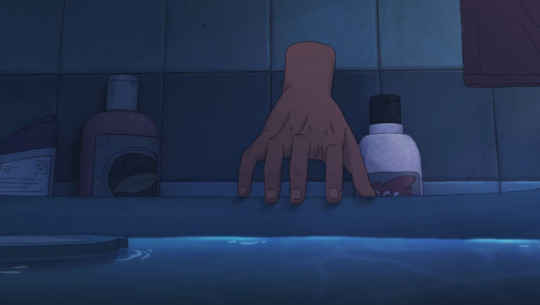
116. I Lost My Body (Jeremy Clapin)- Not for me ultimately. The film presents itself as above the tropes of cinematic romance but sure seems to circle around them. Clapin is willing to set up the pins of, say, "I'm actually the pizza delivery guy but have kept it a secret for a year," but he is unwilling to knock the pins down with anything resembling catharsis. I don't know if the French bowl, but feel free to substitute whatever kind of metaphor they might get offended by.
115. The Lion King (Jon Favreau)- I saw the original Lion King when I was ten: old enough to think that Disney movies were beneath me but young enough to know nothing about art or the world. And I remember the way that the songs transcended reality: "I Just Can't Wait to Be King" turning into a Busby Berkeley number, "Be Prepared" taking on an expressionist green tint. It was mass entertainment that was far from experimental, but I remember thinking, "Can you do that?"
As an artistic experiment, this remake is kind of confounding, to the point that I don't know whether to classify it as an animated or live-action film. The final scene starts upside down, and your eye adjusts to the idea that you're looking at a reflection in a stream, but that stream is a Caleb Deschanel-aided, computer-generated reflection of a reality. However, I return to my original point: You're missing something if you think The Lion King is a better story if it's more realistic. Capably made as The Lion King 2019 is, no one is referencing 42nd Street. These Disney remakes just reference themselves.
114. Stuber (Michael Dowse)- The critical community has been pretty forgiving of Stuber; I guess because it's a type of studio film that used to be common but now is not. Judged on its own merits, however, it's labored. The screenplay circles around questions of masculinity, but not in a way that hasn't been done better in other recent comedies. Perhaps most disappointing of all, I've seen Iko Uwais and Bautista fight before, and it looked a whole lot cooler than the way they're sliced and diced here. The ending's sweet at least.
113. After the Wedding (Bart Freundlich)- Think of what Julianne Moore could have accomplished in the time it took in her career for her to shoot four crappy movies with her husband. This is the type of melodrama that makes more sense after all of the revelations have cleared the air, but that doesn't mean the preceding hour and a half was any more fun because of the aftermath.
112. The Goldfinch (John Crowley)- One day someone's going to figure out how to coherently adapt a Dickensian novel and actually do that thing Crowley is trying to do: condensing two hundred pages of back story into 1/8th of a page here or a line there. Somebody's going to be able to figure out the little moments that are important and the big moments that aren't. And you'll all be sorry.
The movie is ultimately hampered by the bad ending of the novel, in which a person who isn't a mystery writer has to solve a mystery. Perfect casting for Luke Wilson though. He definitely looks like a whiskey-faced dad who would steal your social security number.
111. The Souvenir (Joanna Hogg)- This movie is autobiographical. The protagonist has the same initials as Joanna Hogg, and she's attending film school at the same time Hogg did. But what a self-own it is for your hero, based on you, to be this inexpressive and restrained and deferential. The film is mostly about a cold romantic relationship--and I guess what the character learns through that experience--but when her beau's friend asks what she sees in him, she can't really say. Neither can the audience. I guess it's a skill to write a scene in which a family is having an argument that is so clenched-jaw reticent that the viewer can't even discern the topic of conversation for a few minutes, but it's not a skill I appreciate.
110. The Dead Don’t Die (Jim Jarmusch)- Jim Jarmusch must be a very good friend.
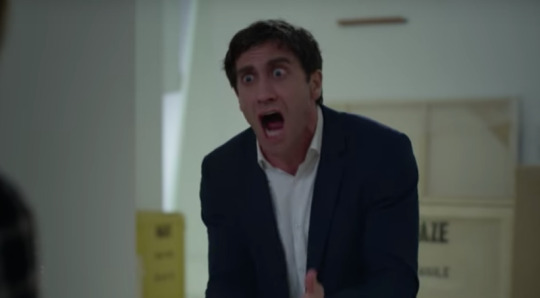
109. Velvet Buzzsaw (Dan Gilroy)- If the film were funny, I wouldn't mind the lack of narrative drive. If the film had narrative drive, I wouldn't mind the lack of atmosphere--glaring for a film that circles around to horror eventually. If the film had more to say, I wouldn't mind how pedantically it says it. If the protagonist's change of heart made sense, then I wouldn't mind that his conversion apparently happens off-screen. At least most of the actors seem to be having fun. I wasn't.
108. It: Chapter Two (Andy Muschietti)- I started squirming in my seat during a sequence somewhere in the circuitous second hour. Bill sees his old bike in an antiques window, haggles with a Stephen King shopkeeper cameo, and finishes the scene on a triumphant note, believing that his old bike will ride like the wind. Cut to the bike falling apart on the road, deflating his pride with comedy. Cut to a flashback of him riding the bike with young Beverly, serene and warm. Cut to him riding the bike again with determination until he stops, terrified. Within fifteen seconds, the film jerks us into four divergent emotions at a whim. The overall tone felt just as arbitrary to me, and that's before we get to the always-unclear line between fantasy and reality. And this time, the flashbacks of each young character's encounters with Pennywise are less scary because we know they all live into the present. Andy Muschietti just does not have a light enough touch to make this movie work.The last forty-five minutes are interminable. But I had all the same gripes with the first chapter, so personal taste is a factor.
107. Trial by Fire (Edward Zwick)- Perfect example of a true story that could use some poetic justice. I don't want to give away anything that the first line of the imdb summary doesn't already, but this ending could have been much more satisfying by changing one or two lines. This is a movie that recreates, multiple times, babies burning alive, but the ending is somehow more punishing. It's also one of those films that should have just begun at the halfway point.
If we can praise special effects when they're done well, then they should be fair game when they're this embarrassing. Zwick definitely put his flash drive into the Lifetime computers for fire.exe.
0 notes